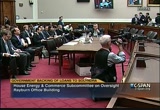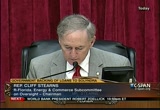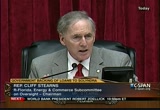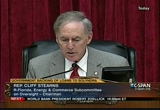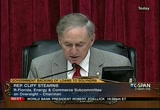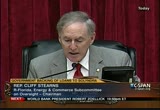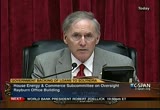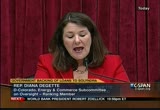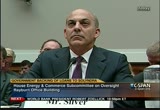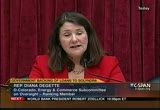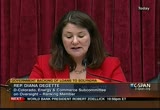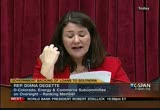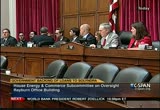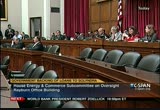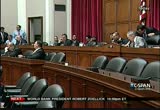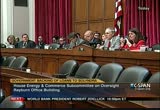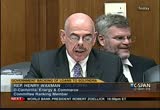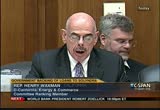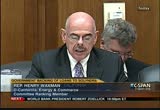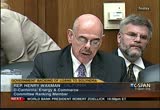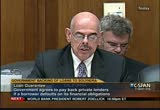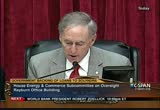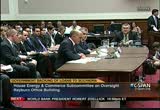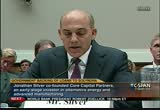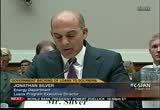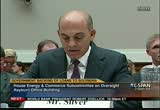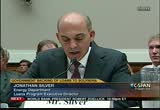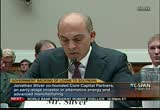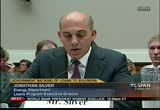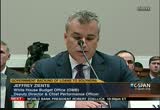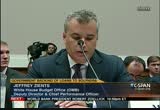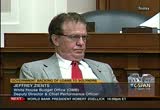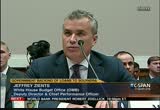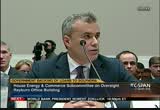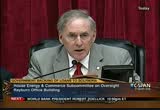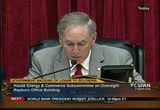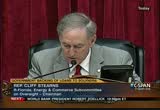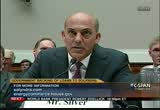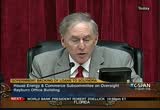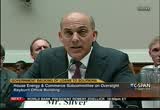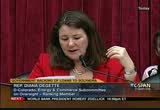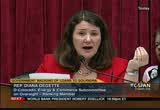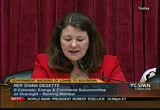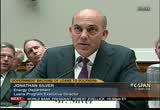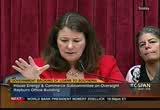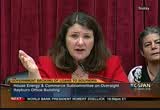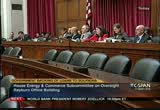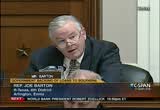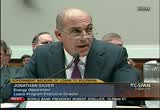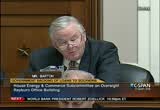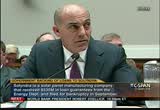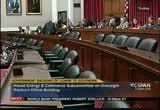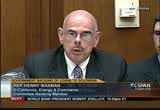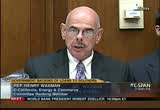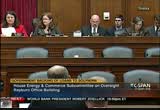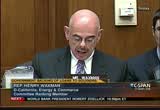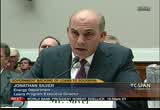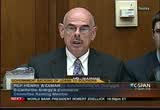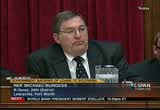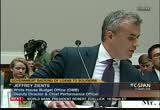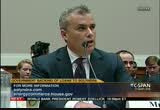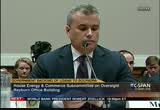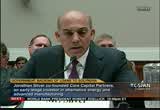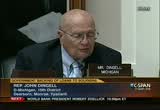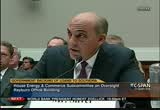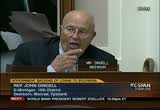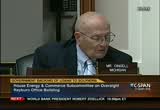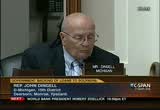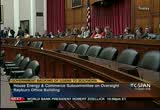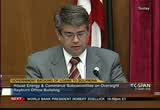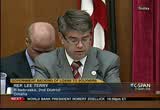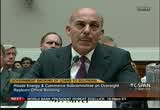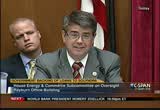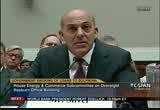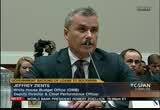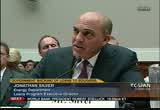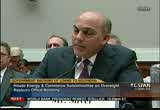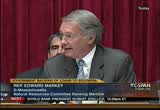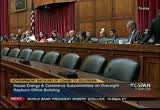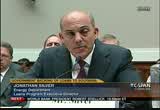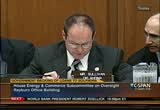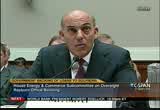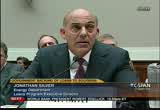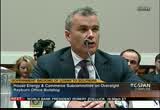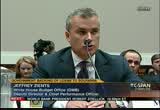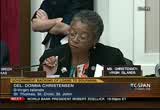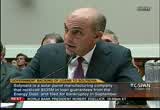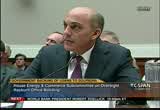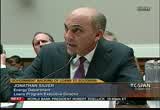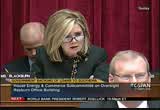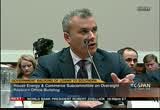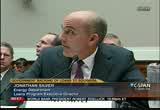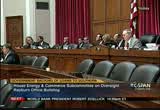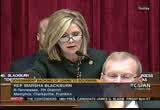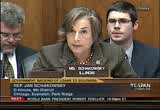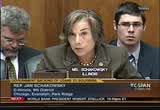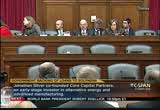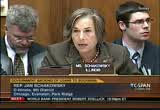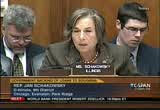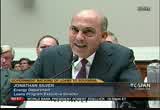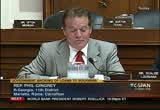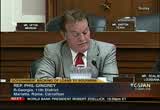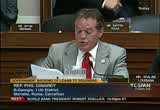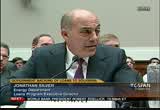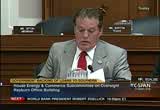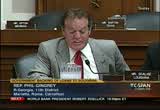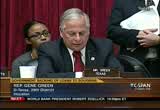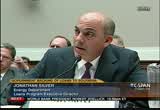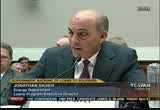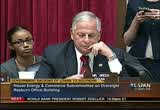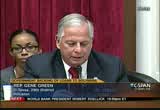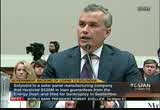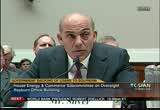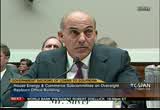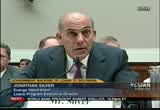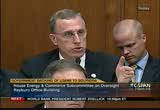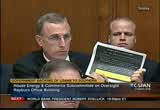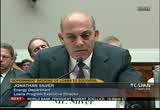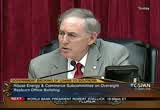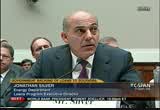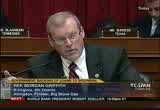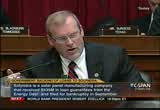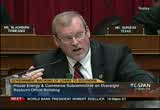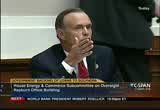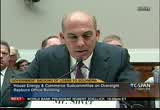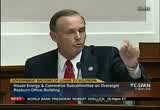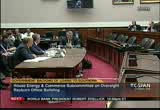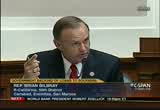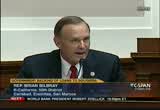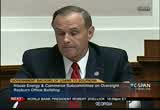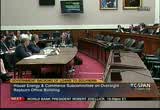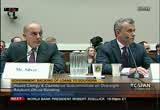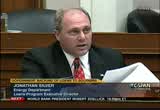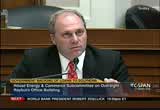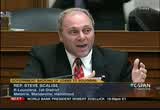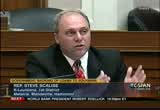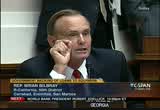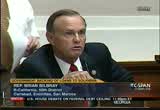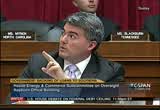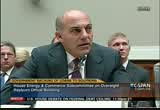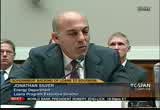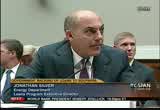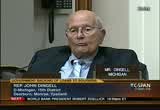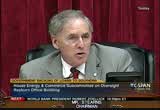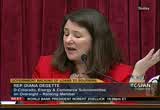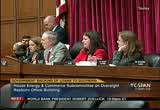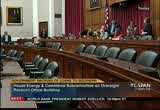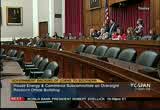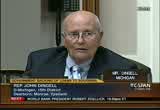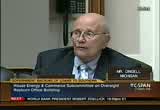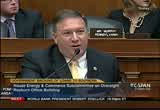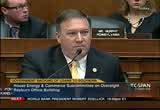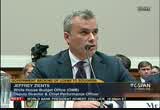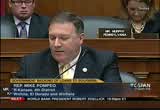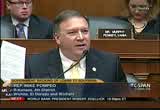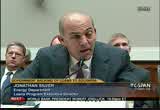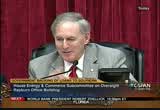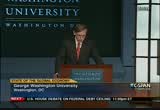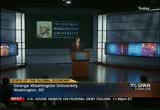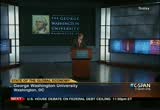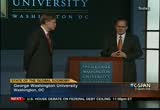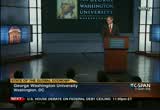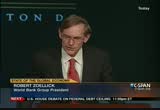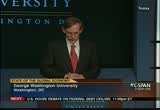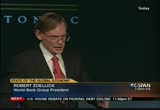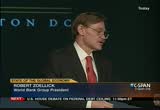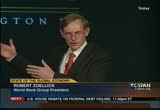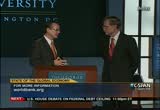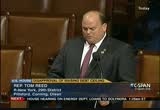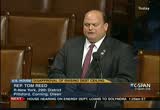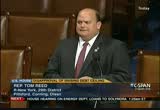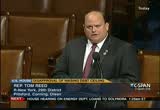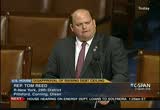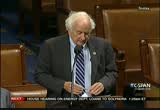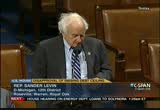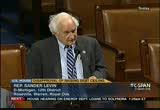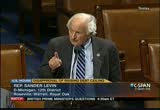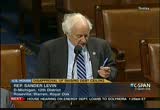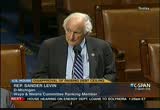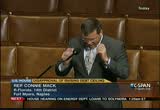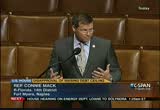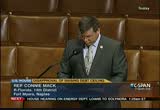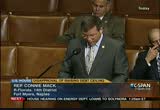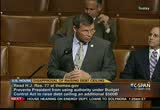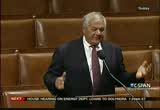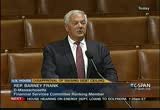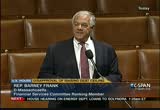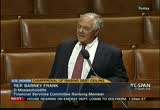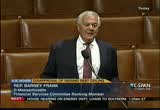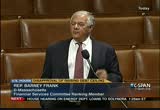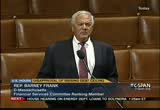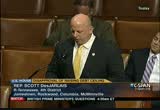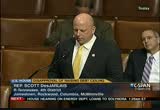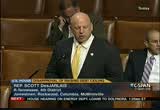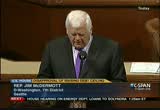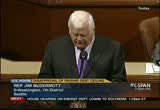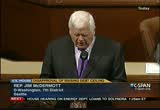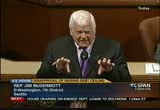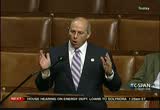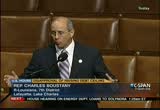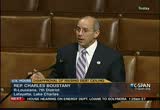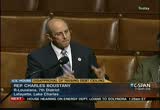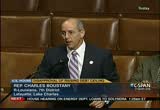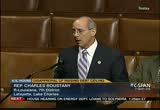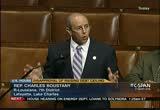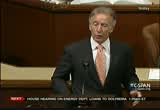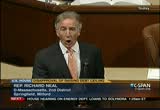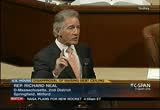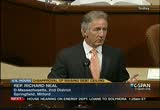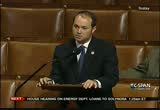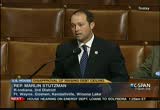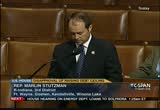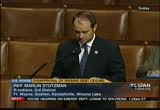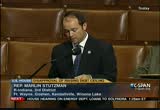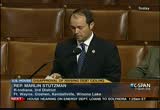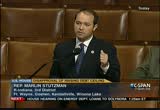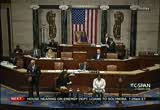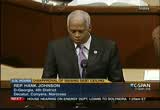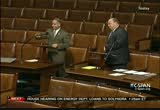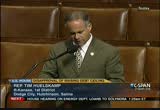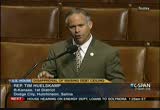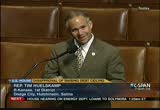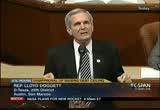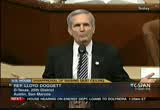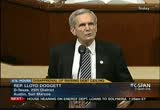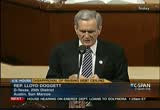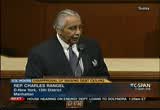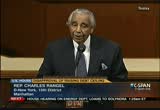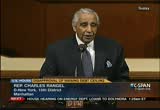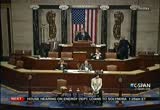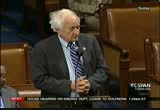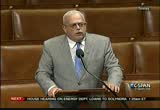tv Capitol Hill Hearings CSPAN September 14, 2011 8:00pm-1:00am EDT
8:00 pm
a long-term fiscal plan and you can talk about stimulus, you can talk about jobs, the real plan is compromise from the members of the congress, grow up, be adults and put what's on the table that we have seen, whether it be the blue dog blueprint, the fiscal commission, other possibilities that may exist out there, be adults about it. it's time to be the adults about it. it is time to be mature adults. that is how you stimulate the economy. that is how you create jobs with stability. thank you so much. >> do you guys want this t? [captioning performed by national captioning institute] [captions copyright national cable satellite corp. 2011] >> tonight, at the house energy committee investigates federal loans granted to solar
8:01 pm
technology company. robert zoellick discusses the world economy. in 2009, solyndra receive money in federal loans. now they investigated it this position -- the decision to grant the loan. this part of the hearing is just under three hours. >> good morning. we convene it this important hearing of the set can maintain -- on the said committee to examine the white house office
8:02 pm
of management and budget in review and subsequent restructuring of the $535 million loan guarantee to solyndra. the obama administration has touted this as the savior for our faltering economy. solyndra was the first guarantee issued by the obama administration using stimulus dollars. officials held out the company as a shining example of how the stimulus was creating jobs and invigorating the economy. two years of receiving this half a billion dollar loan guarantee and six months after doe restructure the deal, solyndra has closed its doors and file for bankruptcy. fbi agents raided the facility last week. one of our witnesses last week it tends to claim that the bush
8:03 pm
administration is equally at fault for approving solyndra's deal and that solyndra was a train ready to leave the station when president obama took office. in reality, at the end of the bush a demonstration, the doe committee voted against offering a conditional commitment. they said the real deal was premature and question the underlying financial support. only after the obama administration to control was the solyndra deal pushed through. we have been asking questions for almost seven months about this deal. we have gathered documents on the department of energy. the committee was forced to subpoena to get basic
8:04 pm
information showing their role is solyndra in the -- in the solyndra deal. they have accused the committee of engaging in a fishing expedition. what the committee's review show is that we were right all along about thistions loan. it should not take restructuring, bankruptcy, an fbi raid from my colleagues to put politics aside and join us and our efforts. the document demonstrates that when they were reviewing this and 2009 it was well aware of the financial problems that opposes. what they also show is that the rush to push of stimulus dollars may have impacted the quality of d.o.e.'s review. the white house has scheduled vice-president joe biden
8:05 pm
appearing at solyndra's groundbreaking event prior to d.o.e. making an announcement. "we have ended up with a situation of having to do resht approvals on a couple of locations. we would prefer to have sufficient time to do our due diligence review and have the approval set for the announcement rather than the other way around." six months after the loan closes problem became severe. an independent auditor issued a report stating "the company has suffered losses from operations, negative cash flow, since the inception and it
8:06 pm
raises substantial doubt about the ability to continue as a going concern." . in late fall, d.o.e. began negotiations about restructuring the loan in order to keep the company afloat. under the agreement, at the private investors were given priority over the government with regard to the first 75 million recovered in the event of liquidation. documents reviewed raised serious concerns about whether this deal was better for the taxpayer. these concerns are spelled
8:07 pm
an e-mail. "what they may avoid default with the restructuring, there is a good chance it will not. additional funds would have been put at risk." we are here to ask these very important questions. is solyndra a litmus test? i am very concerned about where the 10 billion d.o.e. that they have left to spend before the deadline has gone. taxpayers would be better served by not risking even more of their money and using it to reduce our mounting national deficit. thank you. with that i recognize my
8:08 pm
distinguished colleague. >> china's initiatives continue to threaten our renewable energy industry. why we try to revive our economy, it should be clear that solar energy development is not a partisan issue. it is an issue of securing innovation for decades to come. we should have a discussion about how government can support the development of domestic clean energy technology. as we know and as we can tell from the opening statement, there has been a great deal written about today's hearing. did the issue has become very politicized. the purpose of the hearing is to examine the decisions surrounding the solyndra loan guarantee. i cannot help but looking through the larger events of what our national policy energy policy should be going forward.
8:09 pm
it is important to see just what happened with the solyndra loan. the minority oppose this investigation. that cannot be farther from the truth. we believe this is important to understand what happened here and what our appropriate policy is. whenevewhenever oppose producti. i am happy that we now have the documents. i think they should be made available to everyone. it shows the department of energy and both the bush and obama administration supported the loan guarantee application. in 2007, the invited solyndra to cement and administration. d.o.e. had submitted its to the
8:10 pm
committee for review. they continue to work on it and improved the guarantee in september 2009. a pre ipo audit raise concerns about the viability. by late 2010, they determined it is headed toward default. they were faced with a choice, restructure the loan to increase the chances that solyndra could repaid or cut their losses and accept the highs possibility of default. d.o.e. determined restructure was the course of action to reserve the full recovery of loan value. solyndra was given more time to repay the loan. solyndra was required to raise
8:11 pm
an additional $75 million from private investors that would have privacy over the interests before 2013. ceo visited my office and talked about the strong demand for the projects and revenues were projected from 2010. less than two months later it announced it would file for bankruptcy. now the recovery of over five thunder million dollars loan to is a grave risk. it is easier to assess this in hindsight. with a loan this big, it is critical that we get answers to several key questions. did the bush and obama administration's conduct appropriate due diligence before september 2009 guarantee approval? did the department of energy monitor the financial status of solyndra after loan
8:12 pm
disbursements began? did they make accurate representations to the government about the financial prospects before and after approval of the loan guarantee? when the financial situation deteriorated, did they make the correct decisions? score thisunder scor program was designed to help u.s. companies to grow and compete in global energy market in which countries like china and others are providing a wide range of incentives and in sport. we have got to continue to work hard to develop and implement appropriate policies that give clean energy investors the
8:13 pm
support they need to make the u.s. a market leader and that protect the u.s. taxpayer. these are critical decisions. we have asked that the ceo and cfo be called. i believe that will happen in short order. i do not know how they could be in my office telling me things could be better. i yield back. >> you mentioned the documents you have been reviewing. can they all been a part of the record? >> yes. >> so ordered. recognize the full chairman from michigan. >> thank you. in 2009, solyndra was the first
8:14 pm
to receive a d.o.e. eight loans funded by stimulus dollars. it is a model for how the government's venture capital program and green technology should work. they have filed for bankruptcy. we are starting to look at d.o.e. loan guarantee program. some questioned the basis for this investigation. after wrangling to produce relevant documents, the committee was forced to submit a subpoena. i think this shows the committee was more than justify it in scrutiny of the deal. pursuant to our functions, we have a responsibility to pursue answers regarding the use of taxpayer money. this raises several questions about whether the administration did everything it could to protect dollars. why did the administration think
8:15 pm
solyndra was such a good bet and push ahead to provide a solyndra guaranteed this year? why did d.o.e. allow the government to be subordinated to the private investors and a violation of the log? i look forward to the testimony. i want to know what the failure means for the loan guarantee program. is it the tip of the iceberg? d.o.e. has closed over a billion dollars to other green technology companies. it has $10 billion left to spend before the september 30 deadline. the demonstration was so wrong, how can i possibly exercise the
8:16 pm
proper controls when doling out another 10 billion? at this time, i question whether the government is qualified to act, picking winners and losers and shelling out billions of taxpayer dollars to keep them afloat. we began this to shine a bright light on a program shrouded in secrecy. new details are coming to the forefront about who decided to allocate billions in taxpayer dollars. this is important information. the public has a right to know how their money is being spent. it is not the end of our inquiry. the answers we have turned up spark additional questions. i'm committed to pursuing this investigation and conducting rigorous oversight. i hope the administration and our friends on both sides will share our commitment to getting the answers. i yield to the gentleman from texas, mr. barton.
8:17 pm
>> thank you. i think this is a litmus test of how this subcommittee will work together to investigate something that obviously needs to be investigated. i was gratified to hear the ranking member's request that the record include all the documents that have been discovered so far. at the beginning of this investigation, my friends cannot give this document. i support loan guarantee programs. i do not support the process. the credit committee played against it. after president obama had been sworn in, they approved the
8:18 pm
identical loan commitment with no intervening improvement. a staff member said this will run out of cash in september 2011. they declared bankruptcy last week. i look forward to the testimony of these officials. i look forward next week to the testimony of the members of the company. i strongly support all working together to pursue this investigation on a bipartisan basis. >> thank you. i yield the balance of the time. >> thank you. >> i do want to take a moment to point out that the credit committee -- the day after the
8:19 pm
meeting there was a unanimous decision not to deal with that at the time. we know the stimulus bill was about shovel ready projects. it. the shovels -- it. the shovels that this project was ready for - it appeared the shovels of this project was ready for more not there. what this committee calls -- when this committee calls, your response. when we schedule a hearing, you show up. we have a responsibility to protect the people's money as well. it does not appear those interests were followed spirit now the tax pi. now the tax there's going to suffer. >> the gentleman from
8:20 pm
california. >> we're hearing a hearing -- holding an important hearing. taxpayers have over $500 million at risk as a result the bankruptcy. we need to understand what happened. we need to be held accountable. we need to ask whether solyndra misled officials. the c o met with me in my office. he assured me that the company was in no danger of failing. he said the company would double the revenues in 2011. i have a hard time reconciling those reconciliations with them filing for bankruptcy one month later. staffas that are reviewed thousands of pages of internal -- staff has now reviewed
8:21 pm
thousands of pages of internal documents. it shows that under both the bush administration and the obama administration, d.o.e. official strongly backed solyndra. they believe the solar panels offered -- >> can i have an opportunity to speak that strik? >> they thought the internal reviews the they conducted and the external ones showed solyndra could compete. the senators were not realized. today we will ask why. there are and development in the marketplace and solyndra and and d.o.e.argued?
8:22 pm
was there corporate malfeasance? by late 2010, they knew solyndra was facing difficulty meeting the loan obligation. this triggered an internal debate about what the government should do. d.o.e. predicted an immediate liquidation would return. did they favored restructuring because of the potential for recovery more of the investment pared some officials predict investment. some officials warned -- more of an investment. some officials warned of a default. we need to ask whether the right choice was made. given the dollar's address, we have an obligation to the taxpayer to investigate the transaction early. i welcome this hearing. we have urged the chair and to
8:23 pm
hold another hearing where we question solyndra's ceo. i disagree with the policy conclusions that republican colleagues have drum. they say the collapse of solyndra shows [inaudible] they argue that government cannot big winners and losers in the energy marketplace. this sounds superficially appealing. there is a fundamental flaw. the majority of republicans on this committee denied that climate change is real. there's no reason for government to invest in clean energy. it is ironic that ceo's of a number of corporations, including bill gates for microsoft, jack holliday, bank
8:24 pm
of america, are all here representing american energy innovation. if they are calling for major investments and alternative energy. so we do not fall behind the chinese and others who are competing. if you live in reality, you know the world cannot continue the dependence on fossil few appear in the last month alone, three manufacturers have declared bankruptcy because they cannot compete with chinese companies. this weekend at the business columnist wrote listing to the republicans talking about the economy is like entering into an alternative universe. he is right. republicans on this committee opposed putting a market price
8:25 pm
on carbon emissions. they opposed carbon pollution. they oppose clean energy alternatives. the fledgling companies have to compete against a fossil fuel industry and heavily subsidized foreign firms. thank you. >> thank you. with that of the opening statements are concluded. i ask that the opening statements of the members be introduced into the record. anyone who wishes to do it? it will be so entered. to our witnesses, you are aware of the committee is holding an investigative hearing. it has had the practice of taking testimony under oath. do you have any objection? the chair advises you that under the rules of the house and committee, you are entitled to
8:26 pm
be advised by counsel. do you desire to be advised by counsel during your testimony today? in that case if you please rise and raise your right hand i will swear you in. do you swear the testimony you are about to give is the culture, so help the bird is the whole truth, so help you god? -- do you swear the testimony you're about to give is the whole truth, so help you god? we welcome to give a statement. with that, we welcome you with your opening statement. >> thank you.
8:27 pm
my name is jonathan silver. i am the executive director of the loan office. i took this position in november of 2009. in 2005, recognizing there's a shortage for clean energy projects from grenoble's to crinkled to nuclear power, a president bush entitled the loan. it was designed to support next generation energy projects which involve technology and market risks that lenders often cannot are will not underwrite. other governments have recognized the value as well. germany and canada already offer such programs. australia and india have announced intend to do the same. none have been as aggressive as the chinese government that provided $30 billion in credit
8:28 pm
to the largest solar manufacturers. that is roughly 20 times larger than america's investment. why is china making this investment that the race for solar manufacturing jobs is the race for winning. this will become a global market worth trillions of dollars. in 1995, the united states manufactured more than 40% of the model sold worldwide. china share has gone from 6% 254% today. china is now home to five of the largest benefactors in the world. by late 2008, and the staff considered solyndra the most
8:29 pm
advanced of the project to review it. by the time the obama at the station took office, they had already established a time line for issuing a additional loan commitment in march 2009. on the exact schedule that have been developed by the bush administration. in september, after several more months, they finalize the loan guarantee. although i was not at the department at times, it is my understanding that it with through nearly three years. it is all before any taxpayer funds are put at risk. the federal government was not alone in the assessment of the potential. some of the most sophisticated
8:30 pm
investors collectively invested nearly $1 billion after conducted a did after conducting extensive due diligence on their own -- after conducting extensive due diligence on their own. solyndra avoided the high cost of pauley silicone and the cost of installing flat panels. a drop significantly taking many industry analysts by surprise and providing a benefit to several of the company's chinese competitors. these developments made it more challenging. the company took steps to respond, cutting costs as revenues increased 40% between 2009-2010.
8:31 pm
despite increasing revenue, and they ran short of cash and faced imminent bankruptcy. the department of energy faced a difficult choice, whether to refuse the proposed choices, ensuring they would close and the government recover only a small amount or to allow the company to pick the financing giving the workers a fighting chance of success. and the government a chance of higher recovery. after an extensive analysis, the department concluded that restructuring the loans gave the u.s. taxpayer the best chance of being repaid. the changes in the solar market have only accelerated. chinese companies have flooded the market with inexpensive panels.
8:32 pm
dst of an in the mist economic crisis. there's been a drop in the first eight months of 2011 alone. these changes were damaging to solyndra. they declared bankruptcy earlier this month. what we're all disappointed, it should not overshadow the professional work that the loan programs have done today or the need to find ways to support clean energy in country, developing a robust manufacturing sector that is critical. it is one of the most important tools, a low-cost financing. this is not picking winners and losers. it is helping insure we have winners here at all. we invented this technology. the question is whether we should take this on our whether
8:33 pm
we will be leadership to other nations and watch as tens of thousands of jobs are created overseas. the administration believes this is a battle we must fight and win. i think the members of the committee. i look forward to your questions. >> thank you for inviting me here today to testify. d.o.e. loan guarantee program is a key part of the to match recent effort to promote economic growth and jobs across the country and a jump start the clean energy economy. omb has been an active participant in discussions about
8:34 pm
major milestones in the implementation of title 17, helping to ensure they are consistent with the framework and policy. these discussions are an to make final um decisions on title 17 loan guarantees. omb has a particular role in the title 17 program under the federal credit reform act of 1990. pursuant to fcra, they must approve cost estimates for all loan programs including the estimate been generated by a d.o.e. for the title 17 program. it ensures that it is accounted for appropriately.
8:35 pm
omb worse closely with agencies. omb giveshis model ombs, final authority to ensure the final costs are presented and reflect estimated risks consistently across the agencies so taxpayer funds are invested in a prudent and effective fashion. by contrast, the final decision on whether to issue the loan for a guarantee rest with the agency implementing the program, d.o.e. in the case of title 17. d.o.e.pproval of a the was in august of 2009. while i was not directly involved in this aspect, what i have learned since indicates it
8:36 pm
reflected a thorough examination and analysis of d.o.e.'s calculation. omb addressed a series of specific questions about the analysis. omb and d.o.e. agreed on the cost. omb assured it was budgeted and accounted for appropriately. it was issued in september 2009. in february 2011 d.o.e. to the restructuring of the debt. the role was the same as the role in the original transaction to enter the work closely to
8:37 pm
understand the specifics of the proposal before making a cost determination. they make sure the loan was an imminent default and the restructuring proposal was expected to be less costly to taxpayers than other options including liquidation. omb determined that d.o.e.'s analysis was reasonable. since then, a challenging global solar market has continued to affect manufacturers including solyndra. the outcome will limit the recovery of funds to the company.
8:38 pm
congress designed the title 17 loan guarantee program to products that might not otherwise receive the necessary capital. they envision that while some of these projects might not succeed, others will contribute to the ability to achieve the clean energy goals. omb will continue to work with d.o.e. to make the program a success and make sure the cost associated with the inherent risks are budgeted and accounted for to protect taxpayer interests. i am pleased to answer any questions you have. >> thank you. i will start with opening questions. if you could possibly answer yes or no. in testimony, you claim that diligencelyndra's due was done by the end of the bush administration. the correct? >> yes.
8:39 pm
creditt it true that a committee met on january 9, 2009 to consider the solyndra guarantee? >just answer the question. it recommended that the solyndra loan guarantee be remanded to the loan program office stating "the number of issues unresolved make a recommendation for approval premature at this time. were you aware when he submitted your testimony to the committee this morning? >> i was. i was not there at the time. it is my understanding that it was remanded for additional data. >> i am asking the questions. i think he is given an answer. in an e-mails sense, a member of
8:40 pm
that credit committee send an e- mail to the fellow members. in e-mail he states "after canvassing the committee, it was a unanimous decision not to engage in further discussion in solyndra at the time." do you understand that they decided the due diligence was not complete? >> no. the credit committee you are referring to is also exactly the same credit committee that approved. >> i understand that. what i said is the truth. isn't that featured the? >> i have not seen that e-mail. i was not there. >> we can assure it is. the d.o.e. should stop talking to solyndra. that was the recommendation. much of the due diligence on the transaction was conducted between 2006-2008.,
8:41 pm
i would like to bring this to your attention. isn't it true that they did not hired the first federal employee until august 1, 2007? >> i am not aware. >> if you do not know, we can provide this. we provided it to the committee staff. by the end of 2007, it isn't it true that the office had only eight federal employees? >> i do not know the exact numbers. >> he was doing the due diligence you're talking about in 2006 and 2007? >> it is made up of wonder 15,000 working professionals. a number of whom are solar experts -- of 115,000 working professionals. a number of whom are solar experts. technically, the credit committee simply refuse a
8:42 pm
transaction and recommends it. >> we have established that they did not think they should go ahead. isn't it true that d.o.e. was reviewing the applications it had received in response to the first solicitation. how did d.o.e. have time to do due diligence like you indicated that that baffled us. >> if you give me a moment to explain i can. the 2006 solicitation resulted in 143 submission. the staff and others reviewed those for eligibility. it is an interview -- an inner review. solyndra was one of those. of the department conducted it on all of the 11. >> isn't it true the first draft of the independent report was not cemented until march 2009?
8:43 pm
-- submitted until march 2009? >> i was not there at that time. there were several market research reports that were directly relevant that were used as the basement for assessments. there's a report done for the project. it was cemented -- submitted in early 2009. this was cemented in early 2009, correct? >> how do you explain a statement in your testimony that the due diligence was conducted in 2006 and 2008? >> i did not say it is in 2006. i said the application was received in 2006.
8:44 pm
due diligence continue through 2008. it would be logical for the reports to be completed after the work was done. >> i think what we have established is that the credit committee during the bush administration found the dill to be premature and remanded for further work. we have all the clear evidence. we are puzzled with their opening statements. i recognize the ranking member. cried thank you. i would like to ask unanimous consent to put the credit committee recommendation that the chairman refer to into the record. >> i had sat hand you a copy of this recommendation. have you seen this document before? >> i have not. >> this is what the chairman was referring to were the credit
8:45 pm
committee remanded the project. if they denied the application and remanded it for more. that is what he was referring to. it is the information that he had on the screen. as i read this document, it says what they appear to have merit, and it did not thoroughly support a finding. it is ready to be approved. in a list for areas that need to be supplemented. do you see that? believe the issues make a recommendation for approval premature. do you see that? a concludes the committee without prejudice remans the project for further development and information.
8:46 pm
>> it to be typical of a credit committee to perform its function in exactly this way. >> was that eventually develop? >> it was initially developed. the summary was represented. >> in march of 2009 the application was approved. was that cemented as part of that application? that is my understanding. >> i wanted to ask you a couple of questions about what kind of policies and incentives we need to have in the united states to promote competitiveness. this is what you talked about in
8:47 pm
your testimony. in your written testimony, you said between 1995-2010 the panel's manufactured in the u.s. dropped from over 40% 26 there. these are tied -- to 6%. china's have increased. half of the world's 10 largest solar panel manufacturers are now chinese. what does that tell us about the state of play in the solar manufacturing industry? >> they have a multi decade perspective. we believe it will be a multi
8:48 pm
trillion dollar market that will generate tens of thousands of jobs. >> what is the chinese government doing to provide support to its solar industry? >> the chinese government has committed up to $30 billion of credit to its four or five largest solar panel manufacturers. it has frequently provided a zero cost financing and occasionally free land and other kinds of subsidies to that sector. >> does cheap labor play a part in china's ability to dominate the world market? >> it has in the past. cheap labor does play a material role in other parts of the world. the challenge is becoming one related to government support for the industry itself. >> it is got as much chief labor -- cheap labor but
8:49 pm
inexpensive debt capital? with your understanding of initiatives, do you really think it is worth us having policies like this loan program to support solar? should we just walk away from it all together? >> i cannot imagine a scenario where we would walk away from what would undoubtedly be one of the largest industries in world over the next several decades. >> do you think there's any way we can actually compete? >> we have an incredibly strong and innovative work force. what we have to be able to support not only innovation -- we have to be able to support commercial deployment. without, we cannot continue to recognize the benefits that come from innovation. >> irrespective of the details of the solyndra case, you think
8:50 pm
these kind of programs are important to development of the u.s. solar energy and jobs? >> and they are critical. their only part of the fabric but they're necessary. >> i wanted to ask you. you talk about this type of 17 funding. there are a number of other projects. has it worked in other projects? is it working in other loan situation stac? >> it is recently new. loans have closed for the most part. we are relatively optimistic that it will perform. >> how large is the portfolio as a whole? >> we have a good estimate. thank you very much. >> the gentleman from mr. texas
8:51 pm
is recognized for five minutes. thank you. >> are you career civil service employees? are you political appointees? >> political appointees. >> both. >> i want to follow up a little bit. less than two months later on march 12 of 2009, the credit committee conditionally approved the loan. is that factually correct?
8:52 pm
>> the timeline is correct. the credit committee that met did not reject the loan. to be remanded it back for further analysis. here timeline is correct. >> the individuals on the credit committee, are those political appointees are civil service? >> civil service. >> for the credit committees identical? >> i believe that to be true. >> the same people and the same agency needed additional information. in march, and the same committee with the same people did approve it. >> technically, the credit committee does not approve a conditional commitment. the credit committee recommends
8:53 pm
a transaction for approval. it has been further reviewed by credit reviewcalle boards. >> they put up a yellow light. >> they indicated the initial questions that have been raised in the first meeting had been addressed. >> what changed in the intervening. ? >> due diligence was conducted. >> specifically? >> due diligence. quite specifically, what do diligence? >> market research was developed. >> is that available? does this have have it? >> we have turned over 35,000 pages of material. >> you are saying that what changed is additional information that was not
8:54 pm
available in january became available. is that correct? >> additional due diligence was done. >> that does not cut it. half a billion dollars that was not supported in january under the bush it ministration was supported conditionally in march. one thing change was the president. we know that change. >> i will have a to get back to you. due diligence is a generic term. >> the cover is very specific things. >> is a possible one of the things that change was political influence? >> i do not think so. i was not there. >> no. and commented to the white house
8:55 pm
that this should go forward? there were no supporters that they step forward and had meetings tha? this was all done in a bubble top? >> i cannot speak to that. i was not there. the loan program career staff that did the work in 2008 under a republican report pointed ceo did under the same individual. >> is it typical of a loan guarantee that a project gets half a billion dollars and that that half a billion is 2/3 of the cost of the project? and that the federal obligation is subordinated to the violation of federal law ind?
8:56 pm
8:57 pm
loan guarantee program to do this on a bipartisan basis. we wanted to move forward with the enterprises that would give us removable alternative energy rather than continue our reliance on fossil fuels. the idea of a loan guarantee is that we often borrow the money. when know there is an inherent risk in a new startup. isn't that correct? >> yes. they set it up to compensate for the lack of financing. there recognize the inherent risks by providing subsidies. >> no one wants to invest unless they know it will return and give them a profit. the government has decided we
8:58 pm
will help visitors could start it. -- get started. it is important for our nation. >> we do not start these companies. the private company does. almost a billion dollars a private equity have gone into this company before the government loan. >> i was taken aback by the figure. between 1995 and 2010, the share of panels manufactured in the united states dropped from 40% to just six%. since 2005, china's market has increased from 6% 254%. half of them are not chinese. rjr now chinese. we would like to compete as well.
8:59 pm
one of the reason china is maneuvering is because the government is putting a lot more money behind their solar energy industry. is the right? >> yes. china has committed $30 billion from a development bank. ofwe're providing by any way subsidies. >> at least. >> who would be against such a thing? this is competition for them. i think that is playing a part in some of the reactions i am hearing. what of the key issues of this investigation as identified by the chairman is whether d.o.e. ecb solyndra as a favor.
9:00 pm
the administration gives "some of this money to people who were contributors are strong supporters." he implied the decision was based on political favoritism. before i ask you about these allegations, i want to give you a background about this guarantee. solyndra applied for this loan in 2006 when bush was president. d.o.e. document outlined the solyndra loan as one of the three highest priorities. all this took place during the bush administration. >> yes, sir. >> in fact, on january 5, 2009, e-mail said "we think a public announcement would knowledge the hard work of the existing
9:01 pm
administration as well as benefits the fund-raising efforts for the equity contribution." in this evil, -- in this e-mail, they are talking about the bush administration. this kaiser group was not the only private investment. a lot of the investment came from another group. that is the walton family, they give to republicans. they were looking to invest in a loan that was given by the federal government. i would like to ask you about or interaction with mr. kaiser. his impact on this loan. did you or your staff have any interaction with mr. kaiser related to the solyndra guaranteed? >> as i said before, i was not here at that time. i have never met or spoken to
9:02 pm
the man. >> same for me both personally and staff interaction. >> did either of you instruct anybody to restructure the loan because of the donations? >> no, sir. >> node. >> did anyone in the administration instruct you or your staff to restructure the loan guarantee because of the donations to the president? >> no, sir. >> are you aware of anything that would suggest that his donations to the president were a factor in determining whether to grant dp solyndra loan guarantee? >> i was not actively involved. >> can you assure us that the decisions that were made on the merit --
9:03 pm
>> it is my understanding that that is correct. >> our chairman has made some serious allegations. i think the real question is whether the vetting was done appropriately and whether it was done based on full representation by solyndra about their economic viability. i do not think we ought to use this failure of this particular guaranteed to discredit what is an important loan guarantee in order to be able to compete in this area with china and to move our country away from dependence on fossil fuel. >> the gentleman from texas is recognized for five minutes. >> we do want the availability -- i look forward to the day where i can reduce my
9:04 pm
electricity bill by putting some type of solar panels on my roof or in my yard. have we advanced the that vision of the future with the activities that have occurred to in regards to this case? in particular, the jurisdictions for which you are responsible for, d.o.e. and omb. your testimony to us today to talk about pressure testing, i believe. we were talking about the enter agency discussions. there are a lot of e-mails that have been produced to the committee and to the committee staff. going through those, we keep
9:05 pm
coming up against the notion that there was pressure. this was a pressure cooker. we have to get this thing out the door because we have a groundbreaking and it might involve a trip by the president. there was pressure, but it was pressure applied in pushing this thing out the door. was that the wrong kind of pressure to apply? >> could i get a copy? >> can we provide a copy of those e-mails? i think we are. i do not want to reference anyone's name because that is not appropriate. >> if i could be provided a copy of those e-mails, that would be helpful. >> we will do it. >> they appear to be in the august timeframe.
9:06 pm
i am not an author of any of these e-mails. i was not actively involved. i will comment, but i do not know the intention of any specific e-mails. to ensure that an appropriate credit subsidies corps was given to the project. this is not about whether the loan should go forward, this is about accounting for the loan. there was some scheduling request from the office, interested and potentially being part of an announcement of the closing of the very first line. i want to be crystal clear as to my understanding. those scheduling request had no impact whatsoever on the credit
9:07 pm
subsidies score that was given to this project. omb staff decided to increase the credit subsidies court to make it more conservative and d.o.e. agreed with that. the closing occurred after staff had done a thorough analysis and decided to increase the credit subsidy scored to make it more conservative. >> let me just reference august 27, 2009, 4:40 p.m. "as long as we make it crystal clear that this is only in the interest of time, there is no precedent set that i am ok with this, we also need to make sure that they not jam us on later details." implying that there was pressure placed.
9:08 pm
>> not being involved, i think what is clear is that omb staff, based on my discussions, comfortable with the credit subsidy score and it was increased during the period of time. >> it does not sound like they were comparable. this time, we will let it go, but tell those guys over at d.o.e. that they will not jam us on this also. >> in preparation, i talk to the career staff and no one hesitated as to whether they were comfortable with the final determination for this project. the credit subsidy score was made more conservative as a result of the analysis. d.o.e. agree with that. >> let me ask you -- this is the
9:09 pm
filing with the sec on the report from march 2010. on the planned ipo. the company has suffered recurring losses, negative cash flow since inception. did this prompt any curiosity on your part? and did it change anything about the behavior? >> as a former venture capitalist, frequently, companies will make filings while they are growing rapidly.
9:10 pm
and a review by an independent auditor is a that kind of scenario. >> i will run out of time. the enter capital is different from a taxpayer subsidy. this is a different universe. your response as a venture- capital list is not consistent with being a good steward of the taxpayers' money. >> the gentleman yield back. >> recognize the chairman of the energy and commerce committee. the gentleman from michigan. >> thank you, mr. chairman. i am very pleased to see that we are having proper oversight. it is my hope that as the go forward, if the majority has evidence of wrongdoing, they will present it to us so they can -- so we can take action. solyndra first applied in 2006 when president bush was still in office is that correct?
9:11 pm
>> yes, sir. i understand that you have people that work would then allow an office and do the due diligence. are these people political appointees? >> no, sir. >> they are career. >> and analysts and advisers. >> >> is it your assessment that it was awarded based upon the project proposal and not on any political influence? you are under oath. >> to the best of my knowledge,
9:12 pm
yes. >> ok. non-political career department of energy employees recommended a timetable to ward's solyndra a guaranteed loan. >> the career staff identified the time frame after having brought it forward in the first credit committee and produced at that time, yes. >> let's fast-forward to the year 2010 when solyndra approached the department of energy for further assistance. was this is due to low-cost competition from chinese manufacturers? they needed help. if your office did not agree to restructure the loan, would they have gone bankrupt in 2010? >> yes. >> without the restructured along, would they have had any chance of success? >> it is hard to imagine how --
9:13 pm
they were out of operating capital. >> would the company's 1100 workers been laid off in 2010? >> i assume so, yes. >> is it's a standard for new investment to have priority? >> it is very typical. >> mr. chairman, i have been waiting anxiously to hear what we have to show that there is wrongdoing. i am still waiting to see something that makes me be concerned that we have some wrongdoing. i do not want us to proceed just on suspicions or doubtful questions or misinterpretations of e-mails or finding e-mails were not exist. let's try to see what took
9:14 pm
place. during the bush administration, solyndra submitted an application for a loan guarantee. in a financial technical review were conducted. in october, the department of energy insights solyndra and 15 other applications to submit to full applications. solyndra submitted their equal application and 2008. the department of energy indicated that they were in the best position to receive the first loan guarantees. in january of 2009, during the final days of the bush administration, the department said 40 timeline to complete due diligence on the application. next, the administration of president obama. during that spring of 2009, the department continued to do its due diligence and completed its
9:15 pm
work. the loan guarantee was issued in september 2009, three years after the application was originally submitted. i am looking forward to hearing from the committee leadership, is there anything on record that suggest that this proposal was rushed through or improper consideration was given or that there was any improper or illegal presser or political activity which might have led to us being where we are today? i would urge my colleagues to look hard for the facts and take all the facts into consideration and. as they go about our business, we are careful in finding the truth and not just having a splendid time making accusations regarding the program and the administration. thank you. >> time has expired.
9:16 pm
i recognize the gentleman from nebraska. >> thank you. i would agree with the gentlemen that we do need to do our due diligence and find out on behalf of the taxpayers, what went wrong. that does need to be our ultimate mission. there is a thing that i am picking up in the questioning. i think everyone must agree that there is some scandal involved in this. i am reaching that conclusion by the amount of time spent to ensure that people believe that this was somehow approved and all the work done under the bush administration. that seems to be mo. if there is a crisis, blame it on the past administration.
9:17 pm
just to set some facts straight, you mentioned in your written testimony provided to us that solyndra submitted its initial application in 2006. most of the diligence on the transaction was conducted between 2006 and 2008. unrepeatable fact is that on january 9, 2011, the bush administration d.o.e. committee remand the application, calling it premature and citing the unresolved issues. it seems to me that not all of the extensive due diligence was on the transaction was conducted between 2006 and two dozen 8, but that the bush to
9:18 pm
administration said very -- 2008, but that the bush administration said the application required more due diligence. then you said, in 2011, more do diligence was done. that led to the approval. is that a correct statement? >> i believe that you mean 2009, commerce and. -- congressman. >> yes. >> additional diligence was down from the time the initial credit committee remanded back to the long program efforts through to the next credit committee which met in march. during that time, additional work on market research and other kinds of things that would normally make up the responses to the questions that the credit committee had asked were developed and answered. >> after the president was
9:19 pm
inaugurated, an e-mail from a d.o.e. states that we are approaching the beginning of the approval process again. the work continued on the application, correct? >> yes. that is my understanding. >> what we would like to know is -- he asked in a way that major responsible for assuming motives of other people. i would just ask you point blank. after you started your role at d.o.e., did you received any communications from a white house employees, a personnel, at
9:20 pm
anybody regarding the solyndra loan? >> when i joined? >> yes or no? >> the solyndra was closed in september and i arrived in november. >> what about the restructuring? >> the restructuring occurred a year later. it was largely conducted on a staff to stop basis. there were interactions -- >> if you are denying that you received any communication directly from the white house to you -- >> what i am trying to describe to you -- >> that is my question. that is an easy question. >> it has an easy answer.
9:21 pm
we work of regularly on this transaction and every other transaction with or enter agencies colleagues at omb. >> i said white house. >> we work with the omb. >> do you want me to start naming individuals? did you received any communications -- i think the question is fairly clear. >> you are under oath and he has asked you a question. >> we interact with different agencies. the question is yes. >> i did not say different agencies. i said the white house. >> individuals in those agencies. >> so you did receive communication directly to you from somebody in the white house? >> i do not recall who would have been involved directly. what i can tell you is that the
9:22 pm
discussions around these transactions are conducted on a staff to staff basis working to develop the transaction. >> once again, have you received -- you -- received any communications regarding the solyndra loan from anyone from the white house? >> [unintelligible] >> obviously, he is not going to answer the question. >> i was not involved with the loan. the loan was closed. after the restructuring, i do interact with component of the white house. i want to draw the distinction between omb and the white house. to get their expertise on the
9:23 pm
energy and financial markets. >> who was the person that you were communicating with and the white house? >> the primary expertise are decided at the time at the office of energy and climate control. >> did they suggest to you -- my time is up. >> to buy, gentlemen. the dumb and from massachusetts -- thank you, a gentleman. >> the gentleman from massachusetts is recognized. >> if you want to waste american taxpayer's dollar, let's talk about the oil industry. if you want to talk about loan guarantees, the southern company has received a loan guarantee 15 times larger than solyndra.
9:24 pm
let's have that hearing. that money is in jeopardy, if you are really concerned. we know we will never had a hearing on the oil industry or the nuclear industry. this is all part of an agenda that deals with the solar industry. let's go back in time. it is back in 2009. you are looking at this loan guarantee. what does the market look like for solar? >> although i was not at the department in 2009, i do have a point of view. prices were extraordinarily high. the balance of system's cost of putting solar paddling on bruce, which involves a penetrating the roots, -- putting solar paneling on groups, it it received a lot of attention and it was particularly innovative because
9:25 pm
it addressed both problems. >> in general, you are not providing financing to fortune 500 companies. you are providing financing to companies that are largely start-ups. is that not correct? >> that is correct. with the added edition that companies themselves are required to raise substantial amounts of capital. solyndra already raised hundreds of millions of dollars. >> when they were being provided, did your agency or any part of the federal government projects a 42% drop in the price of solar panel prices? >> not only did they not predict a 42% drop this year, but between 2008 and nine -- and now, that price has dropped 80%. >> so we can have an honest discussion.
9:26 pm
every time there is a doubling of solar panels a worldwide, the cost of producing them goes down by 18%. that phenomenon has become very predictable. into those 11, -- in 2011, we can see the forest for the trees. the chinese funded $20 billion to solar companies in 2010. we have seen a 42% collapse in the price of the solar panels. was that foreseeable in 2009? >> it was not. china's commitment to this was increasingly clear and i believe that number is closer to $30 billion. >> did anyone in the marketplace predict the 42% drop in the price? >> i cannot speak for every
9:27 pm
analyst, but many professionals were surprised. >> evergreen went bankrupt this year. german solar shot down their arizona solar facility. bp solar shut down their facility in frederick, maryland. this 42% drop this year is as a result of the chinese intervention in this market. this was not noble in 2009. this was not noble in 2010. this was a market intervention. if the republicans think that there is an envelope would be answered and it that was available in 2009, they're
9:28 pm
kidding themselves. we are in a global race. we are doing our best to make this case to the republicans on this committee. they keep the loan guarantees before nuclear intact as they pass their budget. they continue to protect oil companies tax breaks. they are trying to pin a collapsing markets on something that is related to the fact that we are not focusing on the chinese intervention into this marketplace. i did hope that the administration and the policies of financing these programs, it has been a big success story and we have to keep that in mind. thank you, mr. chairman. >> mr. sullivan is recognized
9:29 pm
for five minutes. >> i appreciate you hold in this. mr. silver, on january 9, a 2009, the credit committee found the deal to be premature and stopped all further work. an e-mail sent by a d.o.e. a few days later stated that it was the unanimous decision not to engage in further discussions with solyndra at this time. yet on january 26, 2009, after the obama administration came in, a staffer notes in an e-mail that d.o.e. has decided to restart the approval process. what prompted this decision? >> since i was not there, i can only give you my review of the record. when the first credits committee remanded the debt, they said, we
9:30 pm
have specific questions we need answered before we can take this application up. the career staff went to work answering those questions and when they had been resolved, brought the transaction forward again. >> this was about two weeks before the stimulus was signed into law. did that have something to do that? >> not to my knowledge, no. >> secretary directed d.o.e. to accelerate the process. is that right? >> i do not know what the secretary said. the recovery act had a focus on bringing projects forward quickly. there is a sunset date to get this project done. a lot of work has gone into this and other programs to move money.
9:31 pm
i assume that to be true, but i was not there. >> you say yes? >> i assume that to be the case. >> what d.o.e. did to accelerate the process? >> there were not during many people there. >> how many employees? >> i do not know. i believe it was between 10 and 20. >> did they even have the resources to do the review? >> yes. along programs professionals make use of outside advisers as well. >> want to resolve -- i want to resolve the discrepancy. in your testimony, had been developed under the bush administration. which is it? can you clarify?
9:32 pm
>> i do not think those two statements are incompatible. the career staff in the loan programs office identified the march timeframe as when they would come back to the credit committee when the proposal was originally sent back to them. >> you mentioned earlier that you work in private equity. >> a bit of everything. >> you have looked at businesses and you have seen whether they were worthy are not. in that capacity, would you lend half a billion dollars to this company? >> i am by training and background a venture capitalist and a hedge fund investor. i'm in no position to second- guess what the transaction -- what i can tell a duke is extensive due diligence was done across multiple years on call all the relevant characteristics that would go into a typical financing.
9:33 pm
>> if we could look at slide 10. i would like to ask you about this. given the time pressures to sign off on solyndra, we do not have time to change this model. as long as we make it crystal clear that this was only in the interest of time and there was no precedent, i am ok with it. we also need to make sure they do not jam us on later deal so there is not time to negotiate. this was on august 27. joe biden was to do an appearance very soon after that. the stimulus was done on september 1. what do you have to say about this? >> i was not involved. based on what is on the screen, i think this has to do with the closing of the transaction. sure that is to make the credit subsidies scorer is
9:34 pm
correct. it is not about the loan over all. it is about the credit subsidy score. my understanding, having talked to staff, is that staff was very comfortable and had no hesitation as to its final determination of the credit subsidies court. as i mentioned earlier, this court was increased as a result of their analysis. d.o.e. concurred with that. it was made more conservative. >> you said there was a problem with the model. is that a problem? >> again, not having been there -- i have talked to omb career staff. there was no hesitation as to
9:35 pm
whether the score was one they were comfortable with. it was increased as a result of the analysis. >> the gentleman's time has expired. >> i want to thank our ranking members for insisting that we hear from the solyndra officials. my reading of the testimony suggested that d.o.e. and omb appeared to have done due diligence. part of the collapse appears to be due to forces beyond their control. i also think it is important that we except that innovation carry some degree of risk and it is important that we not use the failure in this instance as an excuse to turn away from the pursuit of green energy and the
9:36 pm
u.s. leadership in this area. my question -- let me start. i would like to ask you to take me through the monitoring system. i do want to point out that a series of the inspector general reports have identified problems with management and controls with the guarantee program. these programs did not begin with you. it is important to ensure accountability for how these programs are run. after the solyndra loan guarantee was first closed in 2009, what mechanism did d.o.e. used to monitor the cash flow? >> in addition to our origination teams, our credit teams, our legal teams, we also
9:37 pm
have a portfolio management group. their responsibility is to monitor transactions post- closing against the covenants in each individual transaction. >> site visits to california? >> there are regular site visits. >> how did it change with the lawn was restructured in 2011? >> the principal difference was that in addition to picking of certain additional collateral, we negotiated and took an observer's seat on this particular transaction. i should say that that is an unusual thing to do and to have. typically, lenders do not have observers see it, but we thought it was important to do that. >> despite the ongoing monitoring, it does not appear that d.o.e. anticipated the
9:38 pm
financial troubles. mr. silver, how would you explain that you were not able to anticipate the financial troubles? >> as several members have mentioned, the precipitous price drop of solar panel prices has contributed to that. i should note that we anticipated there would need to be additional support for this company as it continued to grow. that was built into the destruction transaction. >> -- that was built in to the transaction. do you know why this occurred? >> i have no idea. i am not part of that investigation. >> did solyndra ever misleads d.o.e.?
9:39 pm
>> i have no reason to believe that we were misled. >> what lessons have you learned? how bill loan monitoring practices change? do anticipate making further changes as a result of the bankruptcy? >> the entire program has changed. when i got there, there were about 35 people. we now have between 1008200 people -- 100 and -- 180 and 200 people. applicants are able to submit electronically. we want -- we won a national award for that software. we have a complete records management piece. we will continue to make additional improvement as we can.
9:40 pm
>> thank you for this informations. one of the key roles be to understand why d.o.e. did not see the bankruptcy earlier. you have helped us with some information earlier. whether there are ways to improve the system. thank you for your responses. >> thank you, mr. chairman. thank you built for being here. just a couple of questions. i know you have been here for quite a while. i have an e-mail. mr. silver, you said you had worked on wall street. >> i did not work on wall street. >> for a hedge fund, okay. you are pretty used to reviewing companies am looking at the history of companies and deciding if something is going
9:41 pm
to be a good investment or not. correct? >> yes. >> i would imagine that d.o.e. had a file that was passed on to you when you came into your position. was there a file that contained the different loans that had been approved and the tracking and the accountability to the taxpayer? we are about fairness for the taxpayer. >> as are we, and yes, there were files. >> ok. did you get a file at omb on solyndra? >> i became involved with solyndra around the period dove destruction. >> not the question. did you receive a file that was back today when? >> no. but still had no knowledge of the history? is specifically on
9:42 pm
fcra. >> not my question. was there some history of the progress? >> i was briefed by our staff on the history. >> but nothing in writing? >> i reviewed the document that stopped produced. not one comprehensive file. >> there is solyndra no loan guarantee file at omb. >> my assumption is that the career staff maintains a file. >> there are 2 e-mails. let's talk about these. the first and, august 19, an e- mail between d.o.e. staff, "we still have a major outstanding issue, the issue of working capital assumption." mr. silver, i assume you know something about that.
9:43 pm
let's look at the next day. no one seemed to be -- it looks like we might have had somebody that was doing a little bit of looking ahead. let's talk about this. that e-mail says the issue of working capital remains unresolved. the issue is cash balances, not cost. solyndra seems to agree that the model runs out of cash in 2011. this is a liquidity issue. mr. silver, what do you say to that? >> that would not be surprising. that is what you use modeling to do. >> have you ever seen this e- mail? >> i have not seen this.
9:44 pm
>> this is the first time you have seen this e-mail? were you aware that the liquidity issue had read them. -- rhythm. was that and the file? >> i do not remember. >> remember, you are under oath. >> i arrived in november of 2009. since evelyn was already issued, we moved in and -- since evelyn was already issued, we move into a position where we are managing along. >> i appreciate that. my assumption would be -- my goodness, if we had a loan guarantee program going into different agencies and there is not a comprehensive file, that would show the due diligence, document this comment that would show the orderly process that was followed.
9:45 pm
my goodness, we should be reviewing every one of these loan programs. is omb not looking at this at a comprehensive basis? let's look at the rest of this e-mail. >> it generates a working capital shortfall of 50 million went working capital assumptions are entered into this model. that was the question that was passed. to all of my colleagues, i think
9:46 pm
that when you look at this and you see that someone at d.o.e. was asking those questions, it should cause us to seek to do a little more review. >> i agree that we should closely examine what went wrong and how the process can be improved. i am very concerned here about this is an attack on a program that when you invest and various innovative technology,
9:47 pm
is it not true, mr. silver, that there is some inherent risk associated with each of these deals? not just with solyndra? >> in building, that innovation at scale, there is an old adage that every banks want to be the first bank to be your second line. the program is intended to be the first bank to the first loan. >> my colleagues want to make this a political issue, but they also talk about not wanting to pick winners and losers. we areven's sakes, investing right now billions of dollars in a oil and gas companies. we are investing in a questionable technology, risky
9:48 pm
technology called nuclear. i want to know that in selecting projects, what steps have been taken to make sure you have properly diversified our portfolio? >> thank you for the question. the loan guarantee program does not perceive itself to be in the business of picking winners and losers. the marketplace is the place to do that. as someone who has come directly from that, i support that. we do not look at projects that have not already garnered or will attract substantial private capital. private capital is one of the bedrock requirements for the issuance of a loan guarantee. the question is not really so much are we picking losers and winners. we invest across a diversified portfolio. we invest in the wind, solar,
9:49 pm
geothermal. it is the program of objective, mandate, to introduce a wide range of innovative technologies so that the marketplace can replicate them on their own. when the markets are in those areas, we exit. the real issue is how are we going to -- if we are not going to substantially -- significant participants in this, how will we build these american companies at all? china and the rest of the world are spending billions of dollars to build up these industries. >> you know, september 2, 2011 -- this program should be judged based on its entire portfolio as opposed to what individual alone. i wonder if you could talk about that. but this particular loan in
9:50 pm
context comment either one of you. >> absolutely. we have invested in a wide range of technologies. the vast majority of our investment have been in generation projects, rather than in manufacturing projects. generation projects have agreements through power purchase agreement with utilities. the power grid that is being created is already contacted. the generation projects have a vastly different risk profile than manufacturing projects. the only done it for manufacturing projects in the 40 projects we have done. >> what would be the consequences if this investigation ended up in a conclusion that making
9:51 pm
investments in companies that do alternative energy, but with the consequences for our country be if we were to divest of those kinds of loans? >> the consequence would be profound and they would be profoundly negative. we're competing with countries around the world to see this as one of the largest industrial sectors and opportunities of the next generation. if we walk off the field, there is no way that we can succeed. these industries are different than the software industry. you need platform companies in order to be able to succeed. as i pointed out earlier, five of the largest solar panel companies are in china. 7 art in asia. the eighth is in europe. you need to deploy commercially because that is how you build up
9:52 pm
the supply chains. you have to create demand pull. if you do not do that, you cannot keep those supply chains alive. they cannot reduce their costs. we have under invested and supply chains for decades. we are only now beginning to catch up. >> thank you. thank you for your work. >> thank you. >> the gentleman from georgia is recognized for five minutes. >> i want to make a statement in regard to a couple of my colleagues on the other side of the aisle. comparing solyndra to the southern company. i take little exception to that comparison. southern company owns mississippi power, alabama power, a georgia power, and employs thousands of people.
9:53 pm
it is closely regulated by the georgia public service commission. it has three nuclear power facilities. this loan guarantee by the southern company, comparing that to this loan guarantee for a company like solyndra is a little disingenuous. let me go ahead and start the questions with you mr. silver. when he met with committee staff, it you represented that the restructuring agreement had position to the united states taxpayer for maximum recovery. the company is now bankrupt, and it turns out the government is now in a second position to the
9:54 pm
investors and the deal. those that put up an additional $75 million. why did they allow solyndra investors to be first in line to recovered? isn't your number one duty to protect the taxpayer? >> it is absolutely one of our concerns to focus as much as we can on the security of the taxpayer monies. that is why we reached the decision we did. a restructuring is always, by definition, a decision on on a set of tough choices. it means a company is struggling. the fundamental question that we were trying to answer -- >> let me interrupt you. if you have the legal authority to make those tough choices, the energy policy act of 2005 states open " the obligation shall be subject to the condition that is
9:55 pm
not supported to other financing. " this language makes congress intent seem pretty clear to me. to protect the taxpayers' money. isn't this exactly what the restructuring dead? make the taxpayers' interest subject to other financing. doesn't the restructuring of violate the law? but congressman, i am not a lawyer. the decision was reviewed by d.o.e. and omb council. the conclusion of that analysis was that projects needed to have senior secured position at issue once. i will tell you that as a businessman, and if you do not pretend to restructurings of transactions -- permit restructurings of transactions, lenders will be --
9:56 pm
>> let me interrupt. i understand that. in this particular instance, you said you received a legal memorandum on d.o.e.'s interpretation of the energy policy act. correct? >> they all reviewed this matter. >> who reviewed the memorandum? >> which lawyers? i am not sure. >> it was approved by the general counsel, you just do not know what lawyers. it was approved by the general counsel? >> it was certainly reviewed. >> i want to discuss one part of the legal opinion. please put the language on the statute on the screen. i believe that it slide number one. look at what it says.
9:57 pm
let me read it to you. number three, subordination. the obligation shall be subject to the condition that the obligation is not supported to other financing. that is part of the industry policy act of 2005. the d.o.e. legal opinion seems to be based on the word "is." "the reading of the provision is reinforced by the world use of the word 'is'." you cannot subordinate when the guarantee is issued, but you cannot restructuring. are you basing the opinion that taxpayers can be second in line to investors based on what the meaning is -- of "is" is?
9:58 pm
isn't it exactly the opposite of that plan language? >> i am not a lawyer. i'd relied on the council's judgment on that. >> i think you got bad advice. >> the gentleman from texas is recognized for five minutes. >> i am shocked my republican colleagues to be concerned about something coming from a private sector to the government payroll. i thought that is what we needed more focused on the private sector. i do not like wheeling and dealing either, but it sounds terrible when you hear it. i want to ask some questions about that restructuring. the investigation revealed that there appears to open to a major legal questions.
9:59 pm
the first was the extent that the d.o.e. had the authority and the second was whether the restructuring should be considered. mr. silver, what does that mean to subordinates and interest? >> it means that new capital would be in a prime position on exit depending on the structure. i might point out that typically, in a restructuring, why would any capital come into a troubled situation if they did not come in a prime position? typically, in the private sector, the prime trumps other subordinated capital. we were able to ensure that it was only in the event of liquidation. in the event that the company is
10:00 pm
sold as a turnkey operation, it will not be in a senior position. >> there is language in sec didn't -- and section 17 that my colleague pointed out. the obligation shall be subject to the condition that the obligation is not subordinate to other financing. your legal staff there was an interest. can you describe your staffs legal rationale? >> yes. as best i can. the judgment was made at the law required that the loan issuance be in a secured position. i want to assure the committee as all the transactions we are. in the event that a project struggled to and there were is no surprise to the fact that
10:01 pm
projects struggle, we had the authority to figure out other solutions. i should remind the committee that absent the ability to do this, this company would have closed with solomon hundred jobs lost in the likelihood of any real recovery to the taxpayer being at a minimum. at the time the loan was restructured although the physical building had been built, the plant had not been fitted. it is an average of a project financed that the value of a completed project is greater than an incomplete project. >> key documents provided suggest that your staff had concerns about this approach. you did not step in and stopped them from subordinating the interests. why not? >> staff and lawyers and
10:02 pm
determine -- >> i keep hearing you're not a lawyer. it does not show anything on common sense. >> the determination was the approach was a reasonable , wants to make it clear that the billion dollars of private equity that went into this company is wiped out in that scenario. we're not talking about all of that private capital. just the newest piece of money they came in in order to provide the company with a chance to restructure. >> the second issued was whether it was a modification of the loan agreement. my understanding is that it prohibits all modifications that increase taxpayer costs. the definition does not include a restructuring to workout a troubled loan.
10:03 pm
is that correct? >> this situation was deemed a work around. first, the company was in imminent default. second, it was in the best interest of taxpayers to restructure the loan as opposed to liquidation. when those conditions are met, a loan is considered a workout. >> so it was a workout and not a modification. what was the rationale for determining to restructure and not modified? >> exactly as we have indicated. >> your staff is also expressing concern that the restructuring constituted -- order analysis did you go through to determine their not illegal modifications
10:04 pm
of the loan? >> when we first heard about the financial troubles the staff orientation was going to be there could be a modification. as we worked to understand the financial situation and the fact the company was in imminent analysisand that doe's was reasonable, omb determined that it was a workout. >> the gentleman from pennsylvania, mr. murphy. >> i want to get a couple of things on this in terms of your expertise. had you ever managed something of this size? >> core capital partners was a venture fund. we provided equity. not in a loan of this size. >> at tiger management?
10:05 pm
>> yes. >> you are used to reviewing these things. i go back to on a slide 5, when they had in august of 2009 someone wrote this -- i cannot read this. in terms of saying that some issues with regard to the concern about the health of the company, major outstanding issues. any now says the issue remains unresolved. the model runs out of cash in september even in the best case without any stress. when did you become aware of that the noun? >> i have not seen this e-mail. it was written in august of 2009. i arrived in november. there would have been no reason
10:06 pm
for me to know of its existence. >> you did not know of anybody is concern that there was not enough capital? >> career staff was aware of the issues. >> your job is to recite? >> euros -- you're not aware of a memo saying they did not have the money to keep going? >> i was aware of the staff situation. >> yet things are going through. >> alone had already gone through. >> as we are looking at this and with the move forward to restructuring, the -- >> and maybe i should clarify what the loan was for. we provided a loan guarantee to support the construction of a physical plant called the fab two. that was what colonus for. it was improved in september. that was delivered on time and on budget. the way it alone --
10:07 pm
>> for a company that could not function regardless of what they had. >> that does not say the company cannot function. that says there will be a liquidity issue -- >> meaning they ran out of money. >> meaning they will have to address that issue. >> i'm trying to establish, you handle loans like this. would you offer a loan to accompany the says it will not have the money to pay it back? >> i was not there when this loan was issued -- >> in a time yet been there, you were aware. i want you to stop throwing everybody else under the bus. i hear you throwing your staff under the bus. you are in charge. now you're saying it is everybody else's fault. you tell me which you did with
10:08 pm
half a billion dollars of taxpayer money now saying it is all my staff's fault. i did not know. watery going to tell the taxpayers? we're in a hole for some much money and you're dealing this in a cavalier way. whose fault is it? >> let me say that the 200 professionals working are exceptional professional. >> you throw them under the bus but you are the driver. going back to a slide the sash is the obligation is subject to the condition that is not supported to other financing and now gets restructure its attacks appears to not get their money back. >> any restructuring is based on a decision as to what is the better outcome for recovery. or a restructuring. >> soon made the decision -- who made the decision that this was
10:09 pm
not going to be adhered to? >> it was -- >> we're throwing him under the bus. >> i am not a lawyer. >> did the secretary of energy have anything to do with this? >> not to my knowledge. >> so no one is responsible. this is an incredible burke -- organization. this is phenomenal. what did you do for a living? if you do not know what is happening and everyone else is to blame, what do we tell our constituents who work hard. with so many people in poverty, we say we do not take any responsibility. it is everybody else's fault. >> we work to ensure that these projects -- >> i understand. now the taxpayers are on the hook. >> as was pointed out earlier, there are always challenges
10:10 pm
investing. congress, through the appropriation, -- >> when did this company get their check? >> it does not work like that. >> you could have stopped it when you found the information that they could not exist. that was under your watch. >> our transaction, our loan was for the construction of a physical plant. >> when you realize they could not function, that is when you take leadership and stop throwing your staff under the bus. >> the question mr. murphy is asking, should someone be fired? should anybody be fired? >> the people in the loan guarantee program have worked -- >> you're saying no one should be fired. >> i am saying we are doing the best job we know how to do. >> binder stand. the gentleman from virginia is
10:11 pm
recognized for five minutes. >> if we can have slide one again. i am concerned about this situation. in paragraphs 1 and 2, it references that no guarantee shall be made unless -- in paragraph 3, this is the obligation shall be subject to the obligation not subordinate to other financing. have you read the memorandum law on this? >> i have not read a. >> would it shock you to know that if you pay attention to what is being said, i can give you my copy with my notes on them. it looks like it is a law school project for you come up with unanswered. here is a question. defended the best it can. under this analysis, it says that if we close alone in the morning and at lunch somebody
10:12 pm
says i think we should see if we can get more money from somebody else, we're not going to follow this paragraph. is there is no line. somebody raised that issue. should there be a line and between when the loan is granted and a possible default. you can change the law any time you want to. does that make common sense? you do not have to be a lawyer to know. does it make sense of the congress is responsible for setting our legislative policy would say you're not to subordinate. under the interpretation they can subordinated over lunch. does that make common sense to you? >> what makes sense to me is to ensure we have the tools available to do whatever is necessary in a troubled situation to secure the
10:13 pm
taxpayers' interest. >> that even if it is in violation of the law. common english always trumps legal mumbo jumbo. common english makes clear you're not to subordinate. when you were a help your people subordinated $75 billion to private investors. they're going to invest more money in august. >> that is true. >> they did not do so. when did your observers tell you they were not going to invest any more money see might have been able to anticipate the same courtesy? >> late july. >> or pre trying to get information from you all that time? >> i do not know what you're referring to. and we sent you 35,000 pages of material. >> just so we know, you have all
10:14 pm
these other loans which are in a similar situation, have the subordinated that money? >> i would say that of the two deals that have closed and completed construction, both of those are repaying on a timely basis. >> attached to the memorandum there are charts on how they're going to make money. did you look at those charts? >> i have seen the financials. >> you testified that part of the reasons the lender went under is the chinese were able to make their product cheaper and the europeans stopped buying. wasn't that also true in january? >> it has been true for the past several years. >> when you look at these numbers, how if you know that, how could you anticipate that profits of solyndra would double
10:15 pm
next year? >> i will leave it to the management team to discuss their financial projections. >> you were concerned enough to put a stop -- an observer on the board. doesn't that sound like it is not common sense? >> with all due respect, revenues are not the driver of how a loan guarantee would get paid. we focus on cash flows. those can be managed in a variety of ways. >> you would acknowledge that if there model was a week to begin with. i recognize there is risk. if there model was week to begin with than the market gets worse, doesn't that mean we should have not thrown good money after bad? we are in a worse position to get our money back. >> at the time -- >> are we worse than if we had let them go into bankruptcy
10:16 pm
last january? >> not necessarily. that will depend on the outcome of the bankruptcy. when you are looking at this issue and admitting there are no good choices, one choice is liquidation. >> is a bankruptcy a good thing? >> it is not. ipad " -- >> i agree with you. >> the gentleman from california is recognized for five minutes. >> i would like to address the ranking member of this committee. i hope she recognizes this is not a democrat or republican issue. this is a threat to the legislative cross has. when you can have an attorney play this game. if that means democrats or republican one day direct legislation that we have to say not only it will not happen but
10:17 pm
we must say it will never be allowed to happen, and we have to play this word game. i think this is an issue about the law. i do not care how convoluted an attorney wants to do it. this is not passed. i think this is an affront on both sides of the aisle by this manipulation. we tried to get the job done and we crossed a line. it to a common sense person, they would say you crossed a line. there's a lot of people talking about solar power. some of us have worked in that. are you comfortable with the technology chosen by this company? did you have any concerns about and using this technology? >> i am not a solar technical analyst, but i am highly
10:18 pm
comfortable with the fact that the solar experts at the department of energy and the independent engineers which were well known firms were qualified. >> there have been more false starts than any other form of that protection? >> i do not know that to be true or not. >> china has concentrated extensively in pauley crystal technology. >> china has focused on the market segment because it is a very cost-effective way to mass produce those panels. solyndra technology was designed to overcome a 2 fundamental challenges. the high price of silicon -- >> and they also have a lack of durability and a loss of proficiency as opposed to other technologies.
10:19 pm
you are a businessman. you are looking at a company. do you review their proposal for the construction of their factory, the technology, the plan, development, and its related costs and oversight. >> what is the question? >> how they were building it, other related issues of the cost of building the factory. >> the loan was issued before i arrive to. >> when you renegotiated, did you look at what was being proposed to? >> the plant was built. >> did anybody down the line raise the issue that the proposal was to build a facility in the state of california? can you think of anywhere in america where you probably have more regulatory obstruction to the construction of a factory?
10:20 pm
>> i am not qualified to answer that question. the investors that back to this company in the management team that led it must have concluded this was the right place to do it. >> are you aware of anybody that has notified applicants that if they want to get a grant addition moved out of california into a state with less regulatory obstructionism? >> i am not aware of that. >> maybe we ought to talk about the fact that -- this application which asking to take 30 acres of agricultural land. it was going to be required to be able to go the environmental quality act, getting a permit from the city, their quality from the bay area which is a non-attainment area.
10:21 pm
it was going to require a general permit which means that not only did you of the environmental agencies involved, the state water quality control board, you have the local control board that you had to get a permit from. the california department of occupational safety and has summoned the most restrictive regulations in the world. we had to get a permit from them. you has hazardous-waste which california has some of the most restrictive funds. then you get into waste water. these are some of the permits down the line. nobody in your department raised the issue that this is not only a terrible place to try to find a facility, why build a new facility rather than moving into an existing facility in a state
10:22 pm
with huge empty resources? anybody talk about the question of why would you build a new facility when their warehouse is available? mr. chairman? >> time has expired. your welcome to answer the question. >> at risk of repeating myself, i was not there. i can tell you that applicants for loan guarantees are required to have all of their permits in place by the time the project is undertaken. >> when they get into it. somebody with siding, it is absurd with the kind of a vacancy we have for anybody to talk about or to come to you and say we want to build a new area on ag land.
10:23 pm
>> the gentleman from louisiana is recognized for five minutes. >> thank you. thank you for calling this hearing. we have been pressing on this issue and asking a lot of questions about this loan program for months. i think it is important that we have this hearing now. while solyndra was touted as one of the poster child of president obama of his first stimulus bill. there's a lot of evidence this shows this was something the white house wanted to move through quickly. while this was one of the poster child is -- poster children of the first bill, the president is counting when i call a son of stimulus. another bill to spend more money to do more things like this. if you look at some of the issues we have raised about this program, some of these projects,
10:24 pm
just solyndra alone was touted to create jobs. a lot of us are questioning this kind of debt double down son of stimulus approach where they're going to do more of this same failed policy of spending money we do not have. the president said, passed the bill now. we had not seen the bill. he did not give us the tax sinise said to pass it. he called on the american people. i hope you understand why all lot of us are skeptical when the president says pass the bill now. we see the failure of the stimulus bill. he did that with health care. when the president says pass a bill you can wonder why somebody wants to read a first and look at the details. now when we get to this issue of solyndra, you testified you were
10:25 pm
not in your position until november 2009. you acknowledge there was a file on solyndra. >> i read through all of the materials when i arrived. >> did you see the concerns being raised by your own agency back and prior to your coming that solyndra could go bankrupt by september 2011? >> i saw all of the materials related to the discussions. i need to reemphasize that the loan guarantee was for the construction of a physical factory which was stunned. >> it is your job to go through that a loan guarantee and see if there are things that meet the taxpayer interests. if you also needs to be aware of the way the program is being implemented. after you came in, there was a report and that was pretty scathing about the loan program. they made recommendations.
10:26 pm
they pointed out problems. after you came in, they pointed out that the loan program treated applicants into is this -- inconsistently. they gave examples. did you read this report? >> if you'll give me a minute to respond. >> i cannot give you that long. >> while the report came out after i arrived, it covers the 2008 time period. >> did you make any changes based on the problems? >> we made substantial changes. >> let me ask you on the actual -- you were here. you were in your position after y'all did the restructuring of solyndra's loan. who put the taxpayers in the back of the loan? >> as i've said, i do not know
10:27 pm
it was in violation of law. >> someone made the decision. >> there were a variety of legal -- >> did you make it to? >> the loan program -- >> it's a yes or no question. did you make a decision to subordinate the taxpayers when the decision was made to restructure? >> the question does not have a yes or no answer. >> you either made the decision or you didn't. i think it is straightforward. we have been asking for months. we ask your agency for some of these documents prior to the modification of the lawn. prior to restructuring. stonewalled us. to have maybe if you would have given us that information months ago when we ask for it.
10:28 pm
the taxpayers would not be at the back of the line today. you would understand why we are asking who made the decision? can you get me that information. >> i am happy to meet with you to describe -- >> i want it in writing. i'm going to ask if you can get as the names of the people and the decision making process. who made the decision to put the taxpayers in the back of the line? in violation of the law. i do not know where your council thinks. your council may be part of this list. i want to know if you are part of the list. i want to know anyone in the white house is part of that chain and said we're going to subordinates denied -- taxpayers in restructuring this long. we deserve that answer. somebody made that decision pureed or multiple people. nobody made it. the decision was made.
10:29 pm
would you get that information to this committee? >> we will provide what you need. >> the gentleman from colorado. >> thank you. thank you for your time. i would yield 30 seconds to my colleague from california. >> my biggest concern is -- as someone who supports solar energy. we have to keep the science and not a blind faith. it appears that this process was written by an assumption that anything solar was good. you could force it through and it would work out. the lack of critical review it is the greatest threat for feature solar. it is this kind of blind faith we have to avoid. it has to be driven by science and good investment and not by an assumption that renewable is great. this failure was driven by that. i do not think there was criminal intent.
10:30 pm
the trouble is, with this kind of prejudice for a technology blindly, there is more a threat to that happening in the future. not just financially but the energy independence of this country. >> and i agree with you that we ought to back the science which is why a large group of investors who have done their own due diligence, why the loan program staff from 2007-2009 timeframe and the solar experts came to that conclusion. >> the record shows there was political interjection. there were preconceived ideas that if the was solar it had to be a great package. there was good stuff and bad step. the creature itself is the garbage. being treated as if it was sacred spirit it is not
10:31 pm
critical -- sacred. it is the critical enough. >> thank you. i want to go back to the issue of the e-mails and the approval comment dismissal project approval, and dismissal of this project. -- i want to go back to the issue of the e-mails and the approval, dismissal of the project. you said this was over nothing big. >> i never did say that. committeee credit comm remanded in back. if i may. >> let me just talk about this. >> i would like to 0.1 other thing. >> this is my turn. what you said due diligence took place over -- let me read this to you.
10:32 pm
there is not an independent market study addressing longer- term prospects are the specific company. they raise the issue of obsolescence and the market. it is important to have an independent market. while the agreement is said to be analyzed, the committee did not have access. there are questions regarding the guarantee for the guarantee. there is concern with this. this was an an e-mail on january 9. this is the due diligence he said he did by january 26, and monday. >> i do not know what dates you are referring to. >> no. said no we're not going to do
10:33 pm
that. >> does the gentleman have copies of that ta? >> we do not have copies. >> the credit committee sent an e-mail. you can see what i am talking about. january 26 we are approaching this. >> this is not accurate. if you'll give me just a moment to try to answer this question. there is an extended amount of due diligence that takes place. to the first committee met. there's a month before and met again. i need to make sure this is clear. i do not think it is.
10:34 pm
what gets approved at that juncture is a conditional commitment, not the final close of the loan. the loan did not close until september. additional takes place on the conditional commitment as is true in every transaction. >> what changed from january 9 and january 26 when they did not need that information? >> i do not know what the general 26 date is. >> is says they are under there. >> they said they did not do because they needed the information. >> we are approaching the beginning. >> the credit committee had their observations taken into account. >> this is the beginning of the approval process. >> the credit committee does not
10:35 pm
match your? >-- master? >> they said they will meet in march. they did. >> the gentleman's time has expired. we're in the first round. >> i have a consent request. i am sitting here. i am seeing a wee bit of information carefully. it is supposed to tell me what happened here. pimm i do not think there are any lawyers that would tell your that it would be some fission. the whole document should be placed before us. dig it out. let's see the whole thing. comments.ng a lot of
10:36 pm
saying this is terrible. i do not know what has happened. i do not see anything of their which tells me that we have a clear picture of the problems. require, let'sto inquire fairly. is it possible that my republican colleagues have seen these? >> we will take it under advisement. all the documents will be made available. i asked my cancel -- my counsel to provide these documents. they have them produce. they have not been to you. is that a fear of session and it fair -- is that a fair
10:37 pm
assumption? we passed a unanimous. >> i want to know what they said. i wanted to be put in the record. >> if the gentlemen would yield. >> we recall that the documents were produced under an agreement with the majority that they were to be confidential and were not to be copied or in any way disseminated. what happened was in between yesterday when i found this out at about 7:00 p.m. last night and today, it turned out that the majority released the documents to the press.
10:38 pm
i have just as much concern about this as everybody else. the way the information has been parceled out, the minority does not have the full copies of the e-mail. that is not in the grand tradition. >> we heard your opening statement. we made a unanimous consent. i am told you were given all these documents. this is the one that specified this. we have agreed that we will make them public. >> they were subpoenaed. they did not have the right to tell us. >> i understand that. we agree that they cannot tell us. we will make this public. i appreciate your concern.
10:39 pm
is there any objection to allowing him in the first-round? >> i have no objection but i like to understand this. if we are blind to have a second -- if we're going to have a -- >> we have provided all the documents to you. they were produced to both sides. is a possible your staff has not made them available to you? >> i understand it is the committee staff to make these available to all members of the committee. i understand the committee staff works for all of us. >> we were told we could look
10:40 pm
at the documents but we cannot copy them. the documents could not be disseminated in any way. that is a ridiculous agreement. if we questioned on documents, we have this available for everyone. what we have had today are the slides, taking " without providing them to anybody. >> i think the point is that they should have been made available so that they could go to the task. i think that -- >> if i could ask a question. the e-mails that are in question are from department of energy staff. it doesn't already have access
10:41 pm
to all of that? >> i do not necessarily have access. >> we're not complaining about whether he has these e-mails are e.t here > this is a serious way to proceed. i will take your criticism under advisement. >> no. this is not compromis when you take it under advisement. i do not believe this has been adequate answer for my concerns. and did not like the president.
10:42 pm
i will read about these things from the press. i do not like the fact that we're having all manner of inferences drawn. i am not comforted by these been taken under advisement. it should be a dress now. i expect -- i respect his opinion. we say we have given you all the documents. the fact that you do not have them in front of you is not your fault. >> are we majority or minority? the majority staff is making this decision? they're going above their authorities.
10:43 pm
if the minority is, we have to find out why. >> i suggest you do that and we find out why. >> i find the business of the committee being conducted in a curious way. >> you do not recognize you have all the documents. my staff has provided all the documents to you. >> where are the documents tha? i am anxious to see them. >> i think what we're going to do is continue this discussion. i want to recognize the gentleman from kansas for five minutes. cried thank you. about the fact the king to his office.
10:44 pm
he cannot understand why. nobody in that room had any skin in the game. this is exactly what we get when the federal government tries to put money into businesses. your task has occurred a subsidy. you're out there looking at everyone's loans. >> the point is to put a score. >> that is the purpose spa. i read about this and i was in law school. it was published. i know a fair amount about the process. what you're these cores that were taking index for june watch for the scores that were taken?
10:45 pm
-- what were the scores in 2009 that for taken? >> it increased. >> can you provide to the committee the original score, and the subsequent scored? you will provide that information? >> we will work was that to make sure. >> then you give us the score in 2011. you decided this is how much additional subsidies to be provided. >> 2011 as part of the restructuring. this loan was in imminent default. irish gentry was in the best interest of taxpayers. -- our interest was in the best interests of the taxpayers. it'll cost them less. the restructuring in the annual budget will be reflected.
10:46 pm
>> this is exactly what happens. let me go back. no one could have known what was going to happen to the price of the cells. this was unimaginable that the cells fis would fall below. do you agree? and who could have known? analysts were- many surprised. >> in august 2004 he wrote you hear about company is working toward price disparity.
10:47 pm
the manufacturers will have another world. >> what is the status? >> does see have information? >> i don't. i have a reservation to a unanimous consent request. >> it will not be put in the record. >> i just want to know. are the e-mails and other things that i have been discussing, and will it be put in the record? >> they are. >> i want to make sure everybody is creates a. i want to major in.
10:48 pm
>> i know you were not there at the time. were they aware of the concerns about the pricing of the cells software central? >> there are always there. it was the cost of ownership. there's the balance of systems payment. it is a very competitive opportunity. >> i understand. >> the city of gone from 135 to 180 folks. -- you said you have gone from 1352180 folks. i hope you hired mark.
10:49 pm
>> we have hired an enormous a large and talented pool of former private public experts and executives. i think we have built a very good one. >> the talked about this loss of market share. these't is precisely what programs are intended to do? the cost of production will come down. >> should the new be thrilled that the prices go down taxi a? yeah at sad. >> it is our collective efforts. we issued a different solar manufacturing loan guarantee to a company whose improvement is a process improvements. it allows them to cut the costs
10:50 pm
by 500. the american taxpayers lost half a billion dollars. assigned to pick a particular business. isn't that precisely what happened here? >> we are putting together a portfolio. >> i have been here for the entire hearing. i have heard not a single person stand up and take any accountability for taxpayer money. when asked who is responsible. you point to other people. you take no accountability. for me this is unacceptable. i yield back. >> the witnesses have indicated a request. we will come back at 1230. >> we appreciate your support.
10:51 pm
>> we will have the second round. how will interest him to stay. >> this was just part of the house energy and commerce committee hearing. as always you can view the whole program on our website c- span.org. >> coming up, robert zelig discusses the global economy. the house debate a bill that would rescind the president's authority. the house energy committee investigates federal loans granted to solar technology company. >> tomorrow, we will discuss the president's job bill with chris edwards, policy director at the
10:52 pm
cato institute. it is the center for american progress. it begins live that 7:00 a.m. eastern seven days a week here on c-span. in election marred by political corruption, he lost. he changed political history. he is one of the ones featured. it was friday at 8:00 p.m. eastern. learn more about our upcoming programs at c- span.org/thecontenders. >> follow what the deficit reduction committee is saying on twitter. just use the new twitter list. simply click on the list have under our profile and select the best you want to see. click the "follow close "
10:53 pm
button. --"follow" button. >> he said histories warning lights are flashing. he told students and faculty at george washington university today that america must adapt to the way americans are changing the global economy. he plans to address this next week. this is 55 minutes. >> i want to thank dean brown and the faculty and students. i hope i'm not interrupting this. also all those involved with george washington university. in a village in the mountains of
10:54 pm
china, people assembled to discuss the future. they do not want handouts. they do not want policy descriptions. they do not want lectures. they're ready to leave their path behind. two m and harvard -- eminent harvard people combine their experience in a book that was entitled "thinking in time." they argued it was often misused and lead to bad decisions. he said it was better for helping people think by considering issues with in a continuum of future possibility. what should we be considering in 2011 tax how do -- 2011? how does this relate to be for?
10:55 pm
the meetings are a distant descendant of a gathering in 1944 when they met in new hampshire. this laid the groundwork for three projects that form the basis of what we refer to today as the system. it is a project for the international monitoring fund. it could break economies and societies. a project for the bank for reconstruction and development. it can make long-term capital available to states of countries could grow. it could foster open markets to avoid a downward spiral spirits
10:56 pm
the architects of the system created a model for their work. let's take a moment to recall its. and that world, and they share a global g.d.p. with about 80% with the united states alone accounting for 40%. has creaked and groaned. crashes.nsions and crassu the system has remained broadly in tact. it provided the environment for the greatest era of growth and
10:57 pm
then the largest transformation over the shortest time in world history. it is not cast in stone. the key insight was the need for wisdom. they can act boldly, decisively, and cooperative way. today the warning lights are flashing again. will we face it with denial and our heads in the stand? will we face them squarely and created to lead -- and
10:58 pm
creatively. we need to ask questions about what is really going on. tectonic plates are shifting. in the 1990's it accounted for about 1/5 of global growth. today they are driving the engine for global economies. a the 1990's it accounted for little more than 20% of global investment. today they account for about 45%. some estimates that by 202056 major emerging market economies would collectively account for more than half of all global growth. we live in a world where if china's 32 provinces for countries they would be among
10:59 pm
the 33 fastest growing countries in the world's a red last 30 years. today china is consuming over half the world's iron ore and steel. some of this demand for minerals and materials will ease. it india will be the next to gear up. this is not the 1944 world. be aware of the trans. growthntry's successful model is unsustainable. it needs to do with the challenges of inequality, resource use productivity grus -- growth and over reliance on foreign markets. it china reaches $16,000 of income per person, the effect on
11:00 pm
the world economy would be equivalent, adding 15 south koreans. it is hard to see how it to be sustainable i am skeptical of predictions of advanced economies incredible decline. there is a focus on structural and taxed reforms. advanced economies can turn around and power ahead. predict church predictions of stagnation have proven to be wrong. it is not a time to say that they could no longer afford to face up to challenges beyond their borders. in 1947, an average american
11:01 pm
parent one-third of what they produce today. if the generation was less than 1/3 per person they could face the world boldly, shouldn't we be able to do the same americans, europeans and other developed world countries play vital roles in the innovation and technology and security and development. it still provides the underpinnings for the system. it is in the global interest to be with others. something fundamental is going on. something fundamental is going on. we must democratize development.
11:02 pm
we must change our old concepts and labels not in multilateral commitment. just listen to the labels for a moment. first world" and "third world," "north" and "south," "developed" and "underdeveloped," "advanced" and "emerging," "donor" and "recipient," "provider" and "supplicant," "rich" and "poor"" "them" and "us." the language of development has been the language of old hierarchy. old world. old order. and not without a whiff of hypocrisy. when countries that produce almost 50 percent of their electricity from coal tell poorer countries with no energy alternatives that they cannot use coal -- what are they really saying? "do what i say, not what i do." when countries with large fiscal deficits preach fiscal discipline to poor countries -- what are they really saying? "do what i say, not what i do"" when countries pay homage to free trade but hold back developing countries with barriers, what are they really saying? "do what i say, not what i do."
11:03 pm
when countries advocate debt sustainability for the poorest, yet have debt levels at historic heights, what are they really saying? "do what i say, not what i do." a "do what i say, not what i d"" world economy will fracture, to the detriment of all. the old ways can and must change. already we are seeing the signs of change. around the world, it's no longer european, japanese, or american models that developing countries are seeking to emulate. the mexican and brazilian conditional cash transfer systems are being looked to for their innovation in keeping children in school, improving infant and maternal mortality, and overcoming poverty without breaking budgets. turkey's reform program of the past ten years is providing inspiration for reforms in north africa and the middle east. singapore's combination of open economy, services cluster, anti- corruption, and relentless adaptation to changing conditions is drawing admirers from as far afield as africa, the gulf states, and russia. india's model for information technology services is being
11:04 pm
copied by ghana, kenya, madagascar, mozambique, nigeria, senegal, rwanda, and tanzania. colombia's mass transit system has been recognized as an international best practice and replicated in cities across the region, from mexico city to santiago and lima. relationships among developing countries are changing the development world as we knew it. in the 1990s, developing countries imported 15 percent of their merchandise from other developing countries. today, it's three times that amount. in 2008, south-south fdi accounted for one third of the total fdi going to developing countries -- and that share is growing: today, it's likely nearer to 40 percent. in the infrastructure sector alone, the un has estimated that between 1996 and 2006, developing economies provided over 39 percent of foreign investment in africa, almost 43 percent in asia, and almost 16 percent in latin america. and developing countries are no longer just recipients of aid -- they are also providers. in 2008, new emerging donors contributed between $12 and $15 billion in development aid -- that's equivalent to 10 to 15
11:05 pm
percent of the amount provided by traditional, developed country donors -- and that is likely a conservative estimate. of course, developing countries are beset with problems, too. they are sensitive. what does this mean for the future? the new normal will be no normal. it will be dynamic. more countries are rising in shaping the system. some states may falter. it'll be joining the networks and changing patterns. it will displace new hierarchy's. the new normal will be about countries continually earning their place in world economic official prerogatives. the new normal will be fluid and at times volatile -- with more shocks and crises, but also more opportunities for countries to benefit from the global economy. the new normal will be about lifting growth, not just shifting growth -- creating new
11:06 pm
jobs as old ones slip in value; capturing the potential of sustainable and green growth; stimulating the private sector to innovate, create new technologies, and meet changing needs. the new normal will be about considering jobs as more than a derivative of growth, about recognizing how jobs can contribute to a combination of higher living standards, rising productivity, healthy social change, and stronger social cohesion. the new normal will be about smart economic power: the successful will be alert to learn from the ideas and experiences of all countries, regardless of the old labels. the new normal will be about voice -- of women in their communities, of citizens in their countries, of states in the international system. as we have seen in the middle east and north africa, it will be about social accountability, government transparency, civil society. it will be about citizens who are changing our world even as we race to catch up. we must support them. adapting to this new world is not about modest shifts in voting power at the imf or world bank group boards. it is not about developing countries being instructed by
11:07 pm
developed countries. it is not about north-south, zero-sum politics of complaining and blaming. adapting to this new world is about recognizing that we must all be responsible stakeholders now. in an interdependent global economy, yes, we need china to be a responsible stakeholder. we need china to be a responsible trading partner; to move toward a responsible exchange rate system; to offer intellectual property responsible protection; to make responsible investments; and to pursue responsible environmental policies. but this is not just about china. europe, japan, and the united
11:08 pm
states must be responsible stakeholders, too. they have procrastinated for too long on taking the difficult decisions, narrowing what choices are now left to a painful few. the global economy has entered a new danger zone with little running room as european countries resist difficult truths about the common responsibilities of a common currency. japan has resisted structural economic and social reforms that could retool its sputtering economic model. the united states is facing record peacetime deficits, with no agreed approach in sight for cutting the drivers of debt. it is not responsible for the eurozone to pledge fealty to a monetary union without facing up to either a fiscal union that would make monetary union workable or accepting the consequences for uncompetitive, debt-burdened members. it is not responsible for the united states to falter in facing fundamental issues such as unsustainable growth in entitlement spending, the need for a pro-growth tax system, and a stalled trade policy. unless not only themselves but
11:09 pm
the global economy. the story then won't be about tectonic shifts that have made emerging markets the new engines of the global economy. it will be about tectonic shifts that have left developed countries slamming on the brakes. emerging markets will not sit on the sidelines, they will not go back to that voiceless, powerless, hierarchical 1944 world of leaders and followers, and spheres of influence. the insight from 1944 is the need for leadership, for reasoning our way to a changed multilateral system. the time for muddling through is over. if we do not get ahead of events, if we do not adapt to change, if we do not rise above short-term political tactics or recognize that with power comes responsibility, then we will drift in dangerous currents. that is the lesson of history for all of us, developed and emerging economies alike. but if we get it right, the potential is enormous. over the last 25 years, the share of poor people living in developing countries has been cut by half.
11:10 pm
in just 4 years, child mortality rates have fallen by 25 percent in 18 african countries. over the 10 years before the financial crisis, economies in sub-saharan africa were growing by 5 to 6% on average, and most africans have already recovered and moved beyond pre-crisis levels. if those growth rates could be maintained, african gdp would double in about 12 years, and increase by about 50 percent in per capita terms, generating public revenues for investment in their people, in productivity, in infrastructure unheard of in previous years -- and, of course, reducing poverty. that potential also draws from the private sector. we have seen the power of the private sector in the $77 billion that has been invested in telecom networks in sub- saharan africa over the last decade, boosting the number of mobile subscribers from under 10 million to nearly 400 million. we have seen the potential of we have seen it in the rapid rise in equity funds and other investors looking to put private capital to work in developing countries. my point is a basic one, today we are seeing economic, trade, and financial interdependence incomprehensible in 1944, today we are seeing innovation,
11:11 pm
scientific breakthroughs, and communications, incomprehensible in 1944, we are seeing supply chains and logistics systems that range across continents and oceans. we are seeing multiple poles of growth with new economic powers and a south-south development pattern. none of these developments were envisioned in 1944. can we now combine those changes with a modernized multilateralism to herald a new prior to the bretton woods system, foreign aid primarily assisted with humanitarian crises, famines, floods, earthquakes, or people fleeing conflicts. with the devastation of world war ii, and then decolonization, aid seemed useful to jumpstart private investments that might be
11:12 pm
limited by insufficient domestic saving, capital controls, or weak conditions. aid also became a currency to gain support in a bipolar cold war competition. that 1944 world has changed -- dramatically. it is time to think about aid anew. the changes do not mean there is no longer a place for aid -- nor that developed countries should not honor their aid commitments, nor that we should disregard what aid has achieved. over the last decade, the world bank group has worked with the 79 poorest countries through our -- how much remains to be done. the almost 1.5 billion people today who live in countries that
11:13 pm
will affected by conflict and violence. none of these countries has yet achieved a single goal. aid is not for life. nor should it be with the given with one hand while they exclude developing countries from agricultural or other trade market are restricted their access. in a world beyond aid, assistance would be integrated with an connected to global growth strategy is. in a world beyond, a sound economic policies would be as important as aid as a percentage of gdp. g-20 agreements on and balances insurance reforms on fossil fuel
11:14 pm
subsidies and food securities. it would be an important. the advance emerging-market would assist those with experience. in a world beyond its, it would ensure small older farmers. it took three local currency bond markets and love which -- and leverage new hedges. support for innovation would develop drug-resistant. it would fine new life-saving vaccines. they need to recognize their interest in helping them get on
11:15 pm
11:16 pm
people. giving to to training and jobs. it allows them to deliver not just represent interests. it gives the basis for future productivity. they share information. in the new world economy, good information will be at least as importance -- as important as financial assistance. demint multi lateral innovation to forge progress. and climate change. not always waiting for all of it
11:17 pm
but moving ahead. it means using the multilateral system including the g-20 to look at new financing possibilities. for the world bank group, it means continuing to transform ourselves to become an open knowledge partner, a drawing from, researching, and sharing solutions from around the world. the world bank group would be an intermediate -- an intermediary. it to be a catalyst for action in a democratized model. it would advance multilateral solutions. it should be a champion of a sustainable growth. three years ago i proposed one
11:18 pm
such innovation. i called it a 1% solution. sovereign wealth fund would invest one% of their fund's s.ers i it is from sovereign wealth fund. it brings us closer to a world beyond age. women make up 50% of the global population. it is the backbone of the communities. it produces 80%. women owned only one% of the world's wealth.
11:19 pm
women and girls are less likely to survive infancy. or to survive their reproductive years. women are less likely to be paid for their labor to farm profitable crops. human,dence of women's social, and economic potential is overwhelming. countries with gender equality tend to have lower poverty rates. but a chiles chance for survival is different -- that a child's chance for survival is greater than it goes to the hands of the mothers. this is not just about economic potential. i believe gender equality is a right. nor is it just about developing
11:20 pm
countries. around the world, one in 10 women will be sexually or physically abused by partner someone she knows. we can talk about old labels like north and south. it is still a them and us world. some ask how does this relate to a world beyond e? it is about changing policies and powering every person. we should not release the full potential. it addresses the issue of quality. -- of the quality.
11:21 pm
giving women the right to own lands and run and operate a business. it gives women control over resources in their houses. it takes is closer to a world without it. since i became president of the world bank four years ago, i talked about the importance am modernizing it. i talked about the needs of development for all.
11:22 pm
there are key features. also by government policy around the world. i talked about the need to forge a new contract. it is about as important to development as farms and factories. i tried to outline how a system better reflects this. it is more connected to civil society networks and more committed to a practical problem solving and innovation.
11:23 pm
it is dignity and not dependency. there are some that may argue that this approach is too radical and it will let developed countries off the hook. it may be too risky. it would give the new financial markets that could get them into trouble. developing countries are not ready to be responsible stakeholders. are they any less ready than developed economies appear to be? private sector financial flows dwarf official development assistance. some philanthropic conjure positions urgent contributions door -- some philanthropy
11:24 pm
11:25 pm
the last few years. we have launched a global gender initiative. where in the process of watching -- launching this. we say do what we say and follow what we do. we have some time for questions. we can open things up. please introduce yourselves as we take questions. please take them in the form of a question rather than a speech. >> thank you for year comments. >> can you give your name? >> i'm a professor in the elliot au pa.
11:26 pm
can you not to think about power status but to really push forward into the future? can you follow through changing architecture? >> i think the policy can also be the politics. the dean mentions a represented the united states at thought about that. he was the founder of the monetary fund. it is a quote from bismarck. the sign of a statesman as someone who recognize the state as he grabs onto the hem of her
11:27 pm
cloak. it is the notion that part of a good politician is somebody who is a student -- astute enough to recognize the time to move it. if you go back to 1989, there were voices in germany that said they thought it was a pipe dream. i think the eurozone is now at a similar stage. i think for the success of the country's political leaders legacy, they have to move to where they face the fundamental decisions that talked-about. in case of that particular, you can address some of the issues with political support s. the fundamental choice to be made is ari going to have one that faces the monetary use an?
11:28 pm
there are lots of ways that can be constructed. who will set out the design? he was effective of using the european commission. if you do not do that, are you ready for the consequences for those that are flailing? i could take the case to the united states. i also took place in the national elections. i understand the short-term calculations. my aunt sense is that the lack of confidence is that people are looking for leaders to give them the story. as i discussed, they're having
11:29 pm
debates about cutting the discretionary spending. as opposed to dealing with the rate of increase. that is not going to address the fundamental issue. so and has to be done these issues. part of the challenge of a good politician is knowing when to set off that a leadership course. if you muddle through enter economy continues to decline and you do not have a plan, that is not good. this is very apt. i've spent my time trying to come up with things that have a sense of strategy and have you
11:30 pm
get there. i believe that this plane this is a moment or people will have to do that. they readthere is huge potentiat arrangement, but by sticking your head in the sand, you are not going to deal with it. right here, since the microphone is here. >> i am christina, a professor. i would like to ask you -- >> what is your discipline? >> international development studies. can you talk about restructuring itself and the policies is promoting to enable the achievement? >> well, there is a multiplicity. i think the starting point is to recognize that while we are
11:31 pm
called "bank" that our primary purpose is not finance, which is a little misleading to people because they are used to banks playing a financial role. as i alluded to, when the world bank as an institution, because there are different arms, it is able to take knowledge and learning and experience and be the customize it to come up with solutions -- second, what distinguishes us from a university is that we do have money, and we can come up with innovative forms. our asset management corp., in addition to the way we used to private investment, as well as private-sector insurance and guarantees. but third, we have done almost
11:32 pm
$200 billion in commitments since the start of the financial crisis. a big no. but in the larger scheme of things not of that -- not all of that significant when talking about trillions. they have an effect of building markets, maybe microbe insurance markets, -- micro-finance markets. to do that as an institution, we have to see ourselves as a problem solving, client-oriented institution. the world bank has got a wonderful staff and some incredibly trained people, but one of the qualities that i have been trying to encourage is that when a client has an issue, the job is not to analyze the problem. it is to solve the problem.
11:33 pm
it is not enough to bring us the text book solution, and this brings us to the political economy. what are the institutional constraints? how do you transform and work with the leaders, given the challenges and contexts they face? and another piece, and i think this is critically important for institutions created in the mid 20th-century is the openness and transparency issue. the freedom of information act. and it is great for challenging us, opening the system, maybe having people see behind the wall, that this institution is not all that secretive, and a dimension that i think will have even more power, as i was talking about with the dean, we have opened a 7000 datasets going back decades, free of charge -- we have opened up 7000
11:34 pm
data sets. this is not a hierarchal system with experts, no apologies, but fine universities just coming up with solutions but instead engaging people in the countries, and let me give you a practical example. we worked with google on a mapping system, so you can get on the website, and we have this for the 79 poorest, and we will have it for them all by the end of the year, but you cameron the data about a certain project, and before too long, i want to have its own people in that community on a hand-held device can say this is what you think is happening, but let me tell you what is really happening, which is another way to get to
11:35 pm
some corruption issues, so the things i have talked about about transparency, governance, social accountability, engaging civil society, those are not just words. they have to be an integral part of how the changes go. another microphone over here. we have got a student? maybe here in front. >> hello, my name is -- and i am a senior in an undergraduate program, and in your speech, you talked about reformat in the world of -- you talked about reform adding -- about reformatting the world. >> 14 trade, one for the development, one for the
11:36 pm
monetary system -- one for trade, one for development. the first loan was to france, and so it did not start to work with developing countries for a few years, so the model, the whole world economy was so different than today. in most basic form, that was a system whereby the capital flows were so limited and restricted or the expectations for domestic savings were such that people thought you needed to be able to have this external source of capital because you would not give locally. -- get it locally. we may work with some of the u.n. agencies, right now in the horn of africa or some other issues.
11:37 pm
since i talked about reconstruction, as the been mentioned, in a sense, we construction means the bottom billion, the broken states, the code to war -- the ivory coast's -- coasts. i have been in the is dipping universes'. -- i have been in those different universes. how do we try to connect these different pieces? that means working as part of the network, not only the u.n. agencies, but the private sector. so means working with ngo's, in the last significant speech i gave before our spring meeting, i talked about how the bank needs to play a role in some of these countries, which is a
11:38 pm
little different for the bank, because we focus by our charter on support to the government's -- governments, so we are looking at ways to support the transparency but also make the network differently. we need to see ourselves differently. to take another one i referred to, when i came to the bank, a standard situation is that we would make loans or equity investments. i took the advice of a famous bank robber who said when asked why he robbed banks, "that is where the money is." an equity fund of $1 billion
11:39 pm
that is starting to investments in africa and latin america, and we have created other funds. that recognizes a change in the financial enrolled -- world. that is a good reference point. that would have been inconceivable in 1945 or later. the closest you got was the oil wanted tore they amend it to the latin america, and that was a mess. -- where they took it and wanted to lend to latin america. some of the lessons of the 20th century remain very important, but the world has changed. how do you maintain the principles but in a very different environment? there are always tendencies to say, "we do not need these
11:40 pm
other players. it is time to return home. we do not need to deal with the dirty word of multi-lateralism." >> i think we have time for one more question. >> i am from one province in china. you talked about china being the responsible stakeholder, and i am sure from the chinese respective -- perspective, what are the incentives that would encourage china to be responsible stakeholder, and what are the factors that might descend courage them -- might disencourage them? >> a good question. i was talking about the u.s.
11:41 pm
policy towards china, and the theme in the speech was encouraging china to be a responsible stakeholder. the core logic in that speech remains true today, which is that over the past 30 years, china has had this incredibly successful growth, about 10% per year over 30 years, and i had the good fortune of visiting china in 1980 when i was living in hong kong, so i have seen in my own eyes what an unbelievable difference it makes. the reason i asked where you are from, when i am in china, i always try to get beyond meetings in beijing. i was in the northeast, and i try to get a sense of different developments. last year i was in one of the poor provinces in the southwest. china, too, benefited from the system that was created after world war two.
11:42 pm
the idea was to leverage off this economic system and do it in a pragmatic way. so the first and perhaps core point is that china benefited from the security stability. it benefited from the trade system. it benefited from international financial flows and investment, direct investment that went into china that brought technology and create jobs, so we have an interest, a self interest, in perpetuating but also adapting and modernizing that system, and as china grows larger and is a bigger part of the world economy, that is only more so, so what happens in the euro zone is going to affect what happens in china or what happens in the united states. it is true for china. it is true for other emerging economies, as well. what is difficult, and this is where the developing countries need to figure out with the developed countries where the structure is. you still have 75% of the people
11:43 pm
earning under $2 per day, living in so-called middle-income countries, so when i go to china, they say, "yes, we still have a lot of development challenges." that is a reasonable point. but at the same time, my counterpoint is that china has grown so successfully and is now so large, it cannot ignore the role in the international system, so beyond that, you really have to take each issue, whether it is climate change or security policy or monetary affairs, but let me give you a small but perhaps technical one that shows you how this can work in practice. some of you that have steady development may know about this program that gives grants to the 79 poorest countries. because of that financing model, we have to replenish it every
11:44 pm
three years, so we just finished the 16th replenishment. part of the money comes back from our own profits. part of it is contributions from developed countries or other. when i first became president of the world bank in 2007, china, which no longer receive these bonds but had been a recipient years ago, but which no longer receive these funds but had been a recipient years ago -- china, which no longer received these funds had been a recipient years ago, they made a contribution. we said it would help if china repaid some of those funds from the past. it is not a big cost, but china is paying billions of dollars. here is a way that we raised
11:45 pm
$49.30 billion for this program. when you can make a couple of billions of dollars, that is very helpful. this is a way in which an emerging market country can contribute in a slightly different fashion. we can go through other examples and climate change, as well. it is in the self interest of china not to have heating that melds the glaciers -- that melts the glaciers. it is in the self-interest of china to have an open capital investment model. over time, the renminbi will have to move, which china says it wants to do. one of the reasons i was in china is that china believes it needs to make structural changes, as i alluded to in this speech, because it can no longer deal with the previous model. this will help with the courage
11:46 pm
to change -- the currency change. the whole reason i got into some detail here is that i have talked in cinematic terms, but there is hard, detailed work in making these happen -- is that i have talked in certain terms, but there is hard, detailed work in making these happen. that is the challenge that now faces not only the developed countries but the emerging markets, as well. thank you. [applause] >> president zoellick, that was a tour de force, or in your case, another tour de force, because i have seen you speak before.
11:47 pm
the smart thing to do. hopefully those around the world will listen as closely as we have this past hour. i realize that as president abbas -- of the world bank, you have to give speeches around the world, but the most environmentally friendly way for you to give the address is just to walk down the street and join us here. [laughter] [applause] on behalf of my two colleagues and especially on behalf of our students, we present you with a small token of our appreciation and admiration. >> thank you very much. [applause] 1 close in more, since many of you -- one closing statement since many of these students have just started.
11:48 pm
you really, whatever country you are from, whether the u.s. or china or others, you have an incredible opportunity to be at this world-class university to focus on these questions, and the issues i am talking about are not just going to be decided by the chancellors and presidents and prime ministers that are in office today. these will go on. these will be your questions. you have the opportunity to get the education you have had so far and to be here, but i also like universities because i think there is great potential and power that comes from a next generation, and one of the reasons i wanted to say these things is that they will be many of your challenge is to address , so the thank you. -- challenges to address, so thank you. [laughter] -- [applause]
11:49 pm
[captioning performed by national captioning institute] [captions copyright national cable satellite corp. 2011] >> up next on c-span, borrowing money. the house energy committee investigates money given to a now bankrupt solar panel company, solyndra. and on "prime minister's questions," prime minister david cameron addresses issues pertaining to the economy. >> mary schapiro tomorrow testifies on capitol hill. we will have live coverage of the house financial services committee beginning at 10:00 a.m. eastern on c-span3. >> the best-selling author of "a beautiful mind" talks about the intellectual pursuits she believes have helped people worldwide. this is one of the many
11:50 pm
nonfiction books and authors this weekend on c-span2's booktv . and we will talk about voter suppression, modern afghanistan, and an author, filmmaker, and political activist, michael moore, recounts his own life, from starting a newspaper to winning an academy award. he will also be our guest next month on "in depth." get the complete schedule on booktv.org. >> see what political reporters are saying and track the latest campaign contributions which the c-span website for campaign 2012. --with the c-span's web site c-span website for campaign
11:51 pm
2012. this is at c-span.org/campaign 2012. >> the house today considered a resolution that would prevent president obama from exercising the authority to raise the debt limit by an additional $500 billion. a similar measure was rejected by the senate late last week, 45 to 52. here is debate on the measure from the house floor. it is 1.5 hours. mr. reed: madam speaker, i am pleased to offer this resolution of disapproval of the request from the president the united states to borrow an additional $1.5 trillion. dealing with this national debt is one of the primary reasons why i ran for congress. it is to stop the endless borrowing of washington, d.c., on the backs of our children and our grandchildren. i am also pleased to offer it in the house as a demonstration of a commitment to ending the
11:52 pm
decades' old borrow and spend practices and mentality that runs rampant here in washington. our national debt has reached its breaking point. the need to make serious decisions to get our spending under control has never been more urgent. as we have all heard the words of admil mike mullen, chairman of the joint chiefs of staff, when asked what is the most direct threat to our nation, his immediate and clear response was that it is our national debt is the greatest threat to our national security. and the recent down grade of our national credit rating by snchings&p further demonstrates the necessity of making significant structural changes to the way we spend money in washington, d.c. my focus here today, because we know the senate has acted and this resolution did not pass the senate and is likely not to result in the borrowing -- barring the president tting
11:53 pm
the half a trillion dollars of borrowing, but it's to send a message to the nation that we need to act proactively in this chamber and in both chambers of this house. we need to recognize the national debt and rather than deal with it in a crisis situation, we should be mindful of it in a proactive, so we have good, sound policy to the issues that we pace, and finally taming this beast known as the national debt. we have spent over $15 trillion of money we did not have. that national debt is growing at the rate of $58,000 per second. that is $55,000 owed.
11:54 pm
nation for the generations yet to come. the american people have made it clear, they spoke loudly in november, 2010. and we are listening. more borrowing won't solve the problem, in fact it will dig the hole even deeper. borrowing even more before we can enact significant spending cuts to begin dealing with the root proem is a foolish errand. we have a responsibility to future generations to take immediate action. i will continue along the path of working on both sides of this chamber to try to identify common ground to solve this crisis in the national debt. the continuing resolution last spring and the budget control act which requires this vote are only the beginning. this war on our national debt is going to go on for many years to come.
11:55 pm
but we need to take those first steps because with every journey it takes the first step to get us on the path to success. i know the battles ahead will not be popular and there will be tremendous political pressure on all of us to continue to borrow and spend as usual but we must stand up to that political pressure. we must honor our oath to do our duty and do our job in this chamber and that means standing up and changing the path of shington, d.c. making difficult decisions now is the only way we can win this war on what is a common enemy we all face. our national debt. it is my hope this resolution continues to show the president how serious we are about this issue. and at the same time that we're dealing with this issue we will focus on jobs, we will focus on the economy, we in the united states congress have to be able
11:56 pm
to walk and chew gum at the same time. we are competent men and women in this chamber who love our great nation. and we must come together on all fronts, at all times, not only on the national debt but on our economy, on getting americans back to work. and i think with that bipartisan attitude it will be amazing what we can accomplish in order to achieve all those goals, the national debt being one of the critical ones that we must face head on today. and with that i'll reserve the balance of my time. the speaker pro tempore:he gentleman reserves the balance of his time. the gentleman from michigan. mr. levin: i yield myself such time as i may consume. the speaker pro tempore: the gentleman is recognized. mr. levin: madam speaker, we should not even be considering this resolution. i repeat, we should not even be considering this resolution.
11:57 pm
we should be moving forward, not backwards. this resolution is a dangerous distraction from the unprecedented challenge before us. 14 million americans are looking for work, 14 million. the census bureau reported just yesterday that the poverty rate is higher than it's been in 17 years. 17 years. and median income in this country is at 1996 levels. 1996 levels. the president has proposed a job bill that one knowledgeable observer, mark zandi, estimates would create 1.9 million new jobs and add two percente points to g.d.p. growth next
11:58 pm
year. we need action to spur economic growth and job creation. that's what we should be considering today. instead through this resolution republicans want to prolong the agony of theebt limit debate and take us back to therink of default which would be where we would be if you succeeded. this bill can pass e house only if members who voted yes in august on this issue decide in essence to vote no in september. yes, in august -- yes in august, no in september. this nation wants us toe guided by the needs of the nation, not the internal
11:59 pm
politics of a caucus or a conference. we've seen the consequences of that kind of thing. down grading our credit rating, i quote, it involved a level of brinkmanship greater than what we had expected earlier in the year, end of quote. in august, consum confidence dropped by the largest amount since the peak of the financial crisis in 2008. and the conferenceoard noted a direct link between that fall and the debate over default. and i think we need only to check 401-k statements from august to remember the precipitous drop in the stock market. were this resolution to become lawnd all those who speak or
12:00 am
vote for it have to understand that, the u.s. would default on its obligations for the first time in our history. this would throw our economy back into deep recession, trigger $400 billion in immediate job-destroying cuts and call into question our ability to pay earned social security and medicare benefits. madam speaker, we should not be considering this resolution today. we should be moving forward on the president's plan to jumpstart our economy and create jobs for american workers. the american jobs act would put more money in workers' pockets through a temporary tax cut, saving the average family $1,500 a year. it would also keep over six million workers from losing
12:01 am
while they continue searching for work and provide this proposal new employer incentives to help get them hired. if we don't act on these issues over a million people will lose their unemployment benefits in january and over two million in february. o we need to act, we need to look aheanot just try to go backwards. so i strongly urge my colleagues to vote no on this resolution so we don't waste one more minute on a renewal of republican brinksmanship. 14 million americans who are looking for a job and 43 million americans who are living in poverty cannot afford to wait one minute longer.
12:02 am
i reserve the balance of my time. the speaker pro tempore: the gentleman reserves the balance of hitime. the gentleman from new york. mr. reed: madampeaker, at this time i'm pleased to yield five minutes to the gentleman from florida, mr. mack. the speaker pro tempore: the gentlemanrom florida is recognized for five minutes. mr. mack: i thank the gentleman and, madam speaker, i rise today in support of this resolution of disapproval because washington will continue to have a deficit spending problem until we say, enough is enough. and we pua stop to it. the gentleman across the aisle would like to say that this is going backwards. every time i hear someone on the left speak it ends up costing us more money. we need to stop the insanity here in washington, we need to stop this overspending. it seems like the only proposals that are coming our way are more spending and more taxes. so i strongly support this resolution.
12:03 am
i opposed the debt deal because we can no longer wait to make deep spending cuts and balance our federal budget. and we need to act now. today we have an opportunity to prevent some of the debt deal from going into an affect and disaemploy the government from borrowing -- disaplowing the government from borrowing another $500 billion, brow another half trillion dollars. recently we've heard the president keep saying on his new proposal, pass this bill now, pass this bill now, pass this bill today. when i'm saying, and the american people are saying, stop the spending now, stop the spending today, stop putting this burden on our children and grandchdren. yet the president wants to continue to go out there and sell a jobs plan that is more of the same. and he wants to pay for it, mysteriously, shockingly, by raising taxes that will do
12:04 am
nothing but kill jobs. so his own proposal that he wants the congress to take up in effect is going to destroy jobs. somehow we've got to convince people here in washington and the president that it's not the government that creates jobs. it's the individual, it's the entrepreneurs, the person willing to take risk, but they're not willing to take risk in an economy where the president continues to try to push moreegulation and more laws and more taxes. it just doesn't make sense and the american people are fed up. they've had it. enough is enough. we've spent way too much money. during the august district work period over 500 people showed up to my town hall meeting in fort myers, florida. and do you know what i heard over and over again? quote, hold the line on government spending. quote, stay strong. quote, reduce government and
12:05 am
this one i love, it not your money, it's my money. see, only in washington do people in this room look at it as your money, as their money is your money. it's not. it's the people who have earned it. a comment was made by a constituent of mine, edward bunett, that i think speaks directly to this issue. he said, and i quote, we have to reduce the size and scope of government. i'm unemployed but just because i don't have a job doest mean my neighbor should have to pay for me. and then he continued on and i quote, the best way for government to help is to step aside, get out of the way and let the individual and businesses do what they do best. he and his family are willing to
12:06 am
sacrifice to preserve the economic freedom for americans. we must cut spending now. that's why i introduced the 1% spending reduction act. as it's commonly known, the mack-penny plan. with this plan we can balance the budget in eight years. by capping spending at 18% of g.d.p. in the seventh year and cutting one pen out of every federal dollar for six years. one penny. everybody at home, e business, every individual has had to take more than one penny out of their home budget or one penny out of their business budget over the last four, five, six years and for the federal government to instead be talking about spending more money each year we need to cut spending. we need to balance our budget. my plan will balance the budget in eight years and for those
12:07 am
who might want to say, well, we're not for acrosthe-board cuts, great. we decide where the 1% comes from but if the congress fails we will have the across-the-board cut. either way we are going to bet the 1% across the board. the deficit spending has to stop. and like i said before, enough is enough. i support this resolution, and i would encourage all of my colleagues, democrats and republicans, to join me in supporting this resolution. thank you very much. the speaker pro tempore: the gentleman's time has expired. the gentleman from michigan. mr. levin: i yielmyself 15 seconds. the speaker pro tempore: the gentleman is recognized. mr. levin: to the gentleman, working together won't work if you undo the work that we did together. i now yield fiveinutes to the ranking member of the financial services committee, mr. frank. the speaker pro tempore: the gentleman from massachusetts is recognized for five minutes. mr. frank: madam speaker, i am is great fan of the tradition
12:08 am
of comedy in america, and i want to salute my republican colleagues for this tribute to one of our great comedians who died tragically early, gilda ratner, who in the early days of "saturday night live" invented the character of rosanne, rosannea danna. she would say something outlandish and when she was corrected her response was, never mind. this is the never mind resolution that the republicans have put forward. put should understand what this says. it says that the bill that we passed that kept the government from shutting down -- and i didn't like that bill, but i like the part of it that kept the government fromhutting down. i was ready to vote just for an increase in the debt limit. singling the debt limit, canceling it, this is what it does. and here's the problem. we have a majority that has a
12:09 am
problem with reality. they have a problem with reality in the field of science. they have a problem with reality in the field of the economy. one of the manifestations of that is their objection to raising the debt limit, that was in large prt necessary because of debts they incurred. you know, when the deblimit came up it struck me, it wasn't my debt limit. i didn't vote for the war in iraq at a cross-of $1 trillion. i didn't vote to give millionaires a tax cut they didn't need or had no beneficial effect on the economy, but i did out of a sense of responsibility to vote to raise the debt limit. i voted against one of them but i voted for several others. what this bill says is, yes, we had to because we were getting a lot of pressure vote to raise the debt limit, but now that i safely behind us, we're going to pretend that we were really against it. so this is the never mind resolution. people should understand this. what this resolution would do
12:10 am
would be to undo what just happened. so weave members on the majority side who have trouble explaining to their primary voters why they had a temporary embrace of reality. now, they're not comfortable with that. their primary voters aren't comfortable with that. so having done what they had to do they now want to pretend they're going to undo it. the senate's already killed this. they don't want it to pass because understand what it would do. it would put us right back in the debt limit situation crisis. and by the way, these are people who are putting this resolution forward who purported -- believe that a major concern with the economy today is the uncertainty that faces investors. so what do they do? they bring up a resolution today that would re-create, if anyone would take it seriously and i would give them the credit of saying that they don't -- but if anyone would take it seriously it would create the uncertainty we have seen in a long time, whether or not the federal government is going to shut down.
12:11 am
so at's the phonyness of this. now, let's talk about the substance. my colleagues claim to be against spenng. apparently in their world the $700 billion -- nearly $700 billion that is spent annually by the pentagon isn't spending. i don't know what it is. we have a situation in which this year in the budget the republicans brought forward a bill to increase military spending by $17 billion while funds for local police and funds for local street repair were cut. so that's the problem. yes, i am for reducing spending. i am for reducing a slowing pentagon budget. we had the president ask it reduced by the number -- reduced by 10,000 the troops in afghanistan. many on the republican side, including the leadership, criticized him for that. do you think that troops in afghanistan are paid for by funny money? the fact is that while on the
12:12 am
one hand we hear these complaints about spending we have people pushing for more and more spending. and i have to say here that -- i would include my administration in this and i think ithe president pects us to go on with certain restraints elsewhere, adding billions of dolrs to what we have already wasted in iraq by keeping thousands of troops in iraq beyond this -- and by the way, why are we keeping troops in iraq? one of the leading advocates for keeping troops in iraq, senator graham said we should keep troops in iraq because we need to police the border between the arabs and the kurds. that at a time when we are denying funds to our cities to police their own areas. so let's be clear. first of all this sham says, you know what, we had a vote to raise the debt limit. we are now going to engage in this mock exercise of taking back what we did. if anyone takes it seriously it will send waves of uncertainty back into the economy. but secondly, going forward,
12:13 am
yes, join us. and that includes some on the republican side. unfortunately a small minority. don't give mo and more and more for the military. not to defend america, not to fight terrorism. those things are not in controversial but to subsidize the wealthy european nation. madam speaker, the nato nations outside the united states spend an average of 1.7% of their gross domestic product on the military. we spend 5.4%, more than three times as much. and my republican colleagues have resisted reducing that. what they want to do is to subsidize the social safety nets and the spending of western europe at the expense of spending here. and how do we do that? by allowing them to hold down the military. so people who want to keep troops in iraq, people who objected when the president began a withdrawal that was too timid from my judgment from afghanistan, people who want to
12:14 am
continue to spend unnecessarily and unwisely, not to defend america but to keep america and as the worldwide policemenave no credibility -- from spending. the speaker pro tempore: the gentleman's time has expired. the gentleman from new york. mr. reed: madam speaker, i'm plsed to yield five minus to my friend from tennessee. the speaker pro tempore: the gentleman is recognized for five minutes. >> for too long the federal government has been allowed to engage in an irresponsible spending spree that's allowed in the accumulation of over $14 trillion of debt. $3 of that debt occurred in the last three years under president obama. does anyone really believe that the american people have received a good return on the nvestment? mr. desjarlais: i know that many of my constituents in tennessee's fourth district don't. unemployment is still above 9% nd our economy is still not creating jobs. an now this president claims to need a $2.4 billion blank check
12:15 am
to continue with his failed policies. that means our national debt would be close to $17 trillion by the end of next year. enough is enough. the latest assessment of our debt indicates it will reach 109% of g.d.p. in the next decade. that will only further degrade employers' confidence in our economy and hinder their ability to creatjobs. we cannot allow that to happen. i was elected by the people of tenssee's fourth congressional district to come to washington to finally make the federal government to learn to live within its means. no more borrowing 40 cents out of every dollar. no more trillion-dollar deficits, no more stimulus spending and more importantly, no more expecting our children and grandchildren to pay for alof this. the debt limit debate provided s with a real opportunity to put our nation back on a fiscally sustainable path by
12:16 am
finally forcing the federal government to make difficult but badly needed spending decisions. decisions that i am more than willing to make. i believe that we missed an opportunity to open up the books and do something that should have been done years ago. prioritize our spending. it is hard to believe that with all the waste, fraud and abuse that occurs within the federal government that we would have any problem cutting enough spending so that raising the debt limit would be unnecessary. when families in my district have spent more than their budget allows they look to how they can cut back. not how they can borrow more money. maybe they don't take a vacation that summer. maybe they go out to eat less often or hold off on purchasing a new car. the point is they know that the answer to getting back on the right fiscal track is spending less, not borrowing more. the same should hold true for the federal government. i urge my colleagues to join me
12:17 am
in voting in favor of this joint resolution of disapproval. madam speaker, i yield back. the speaker pro tempore: the gentleman yields back. the gentleman from michigan. mr. levin: i now yield three minutes to another member of the ways and means committee, mr. mcdermott from seattle, washington. the speaker pro tempore: the gentleman from washington is recognized for three minutes. mr. mcdermott: madam speaker, i rise in opposition to this resolution because it is in favor of the united states defaulng on its debts. the republican party is calling for the united states to default, to tell the whole world, we don't pay our debts. that's what this is about, and it doesn't do one single thing to help american workers or businesses with jobs. now, make no mistake. the house of representatives is being used by the tea party as an attack machine on the president.
12:18 am
they will delay action on anything that helps the economy. the president came up here on thursday with a plan. where's the schedule for bringing it out on the floor? no, we had to delay economic recovery. it'a small price to pay if they can win an election. they don't care about ordinary folks, working people. they only care about the people on the top. instead of doing something to help create jobs they brought up this bill to chin up their extreme base that thinks the only things americans should build together is roads and the defense department. that's what the u.s. government is all abo. nothing else makes any difference. we don't need to invest in health or science. what do we need science for? oh, it will work out. don't worry. in this resolution the reublicans are voting for the
12:19 am
united states not to pay its bills. that's what we're spending time on. now, today is just another day in the alice in wonderland of the republican house. pure politics and nothing to help the american people get bs. this whole republican congress is about the presidential election. it has been from the binning back in january. not helping the middle class. what have they done for foreclosures in this country? what have they done for youngsters trying to go to school what have they done for anybody except try and get the president and they are trying it by stopping the economy from moving forward. i urge my colleagues not to just vote no on this but for the majority to withdraw it and bring up the americans jobs act. the president brought it up
12:20 am
here. it deserves to be brought up to the floor and debated and amended and passed. i sometimes wonder when i listening to the discussion of about some long-term investment, if a republican has ever bought a house, i remember when i bought my first hou in seattle. i was 25 years old. i was a medical resident. i paid $16,400 for it, and i wondered if i would be ever be able to pay for it. i wasn't making that much money in those days. mr. levin: i give the gentleman an additional minute. mr. mcdermott: lo and behold i have bought houses and you know what, 30 years later i paid off that house. that's what investment is about. but the president is saying is we have to invest in this country if we're going it bring it out of the problems it's in and that means infrastructure on the ground and it means in human beings in education. if we don't invest as the
12:21 am
greatest generation did after the second world war, eisenhower said, hey, we have to build roads. nobody said, can't gon debt for all that. nobody said we can't invest in human beings. we did the g.i. bill of rights and that's what made us the strongest country in the world. we took every veteran who came back from the war and said, here's a college education, get it and take it out and make this country work. that was investment. but not today's republican party. oh, no. we can't -- we mustn't. oh. don't you understand investment? i yield back the balance of my time. the speaker pro tempore: the gentleman yields back the balance of his time. the gentleman from new york. mr. reed: madam speaker, at this time i'm pleased to yield five minutes to the gentleman from louisiana. the speaker pro tempore: the gentleman from louisiana is recognized for five minutes. mr. boustany: thank you, madam speaker. and i thank the gentleman from new york for yielding time to me.
12:22 am
madam speake it's been said that leadership is willing to make hard choices. fact-based choices to come up with solutions to solve problems. and deliver results. now, we gathered here last thursday in this chamber to hear the president, with a much-touted plan beforehand that he was going to bring forth to the american people that was going to help solve the high unemployment in this country and get our economy back on a competitive basis. and i can tell you, madam speaker, i sat there and listened very intently. and i left this chamber with grave disappointment. because it's not enough. furthermore, he's oposing taxes, new taxes. taming taxes on energy proction, american energy -- taxes on energy production, american energy production. let's look at the facts of what happened. we had an oil spill in the gulf of mexico and it was dealt with and it was a tragic situation buzz but it has been dealt with. the fact of the matter is we need american energy production to move this country forward. and now what we're seeing with the lifting of the moratorium is this continued de facto
12:23 am
moratorium because of slow walking of exploration plants and permits. now, at does this mean? if we brought back the permitting process to the same time frame we had before, without sacrificing safety, bring it back into a reasonable amount of time, let's say 30 days, to take care of these permits, in one year, the year 2012, 230,000 jobs would be created. new jobs, good, high-paying jobs. not only that, 1/3 of those jobs would be beyond the gulf coast states around this country, in california and florida and in the central part of the country. this would add $44 billion to our g.d.p. and that's just getting things back to where it was. that's not even talking about expanding exploration in the shale formations or looking at the east and west coast where we can do more or alaska. these energy jobs are good-paying jobs and not only that, it would bring in, in one
12:24 am
year, $12 billion more into the treasury and reduce our bill on foreign oil by $15 billi. and that's just getting us back to where we were. now, i stood here and listened to the president. instead he offers taxes. $45 billion more in taxes, new taxes on independent oil and gas companies. that's going to hurt amerin energy production, it's going to kill american jobs and it's going to do nothing to help solve our economy. furthermore he childed us about the trade agreements. wehave three trade agreements that have been sitting there for three years, they've been negotiated, they're ready to go. and he said, congress needs to pass them. well, mr. president, the answer is, that's the process. and beyond that, what is our rade boil? this country's losing credibility globally and it's losing its leverage because we have no trade strategy. a strategy that's going to
12:25 am
promote american manufactured goods, american farmers and their commodities so, that we can sell these around the world to open markets. that will get our economy going. if we want to solve our debt problem, yes, we've got to balance our budgets, yes, we got to deal with the debt problem, we've taken some steps, but i saw nothing that the president offered and that's why i'm here supporting this resolution, to push this president to consider the steps that need to be taken to promote american competitiveness. private sector job growth, that's what we need in this economy. now, the president had the answer, he was standing here at this podium and he had the answer right up there on the wall of the house behind him. there's a plaque up there and it's a quote from daniel webster and that first sentence in the quote says, let us develop the resources of our land. what's wrong with that, mr. president? for god's sake, we need american energy production and it's
12:26 am
simple. stroke of a pen he could solve this permitting problem and at least get us back to where we were, create 230,000 jobs next year, add to our g.d.p. growth and this would be a start, a down payment to a comprehensive energy strategy fothis country. this is a no-brainer. we need natural gas as part of our transition strategy. his policy's going to lock out natural gas production in this country. 97% of it is done by small domestic mpanies here in the u.s. and these taxes will put many of these companies out of business. mr. president, read the plaque. let's develop our natural resources. let's do what we have to do. let's promote a very aggressive export-oriented trade policy. and we need a willing partner to move forward with tax reform. we're getting half-hearted signals. this country needs fundamental tax reform. we want to do it on the house ways and means committee, we're ready, we stand ready as willing partners.
12:27 am
but yet we're getting signals, mixed signals. the president has not shown, his administration has not shown a serious intent to move forward with fundamental tax reform that will unleash american ingenuity and entrepreneurship in this country. and that's what i heard all through august en i was back home in my district. when i talked to folks. they want see an energy strategy. they want to see comprehensive tax reform that simplifies our code and lowers rates, clears up some of the loopholes, and they want to makeense out of the tax code and they want to see us selling goods overseas, letting our ports expand. he didn't even mention maritime infrastructure. we've got bills right now that would improve our maritime structure without costing one penny more in deficit spending. why aren't we acting on these things? we're tired of rhetoric, 're tired of political talking points and what we need is action. the american people have had enough. and i say, let's get to work, let's get this house moving on
12:28 am
fundamental changes that will improve this economy and create private sector jobs. i yield back. the speaker pro tempore: the gentleman's time has expired. the gentleman from michigan. mr. levin: i yield myself 30 seconds before i yield. i want to say to the gentleman from louisiana, i listened intently and i don't understand how he could have voted yes to raise the debt ceiling in august and now in essence he's going to vote no and bring this country back to the brink of chaos. i now yield three minutes to the very distinguished gentleman, a very active member of our committee, mr. neal. the speaker pro tempore: the gentleman from massachusetts is recognized for three minutes. mr. neal: thank you, mr. levin. madam speaker, i'm fascinated by this argument for the people that are viewing it largely because this isn't not an argument about new spending. this is an argument about paying for past spending. so when bill clinton said ado,
12:29 am
say good bay too -- goodbye to the american people on january 19 of 2001, this is fact, not opinion, america was staring at a 5.6 -- $5.6 trillion surplus. on january 20, george bush took the oath of office and when he left eight years later we were looking at a $10.6 trillion deficit. let's recount those years. two wars, $2.3 trillion worth of tax cuts, a prescription debenefit that was unfunded and all of the money they applied to those arguments, and i'm very pleased by the fact i voted against those tax cuts, both against them and voted against the war in iraq, but all of the money that i've just referenced was borrowed money by e republican party. they borrowed all the money for
12:30 am
it. fact, not opinion. and now the bill has come due and they're on the floor talking about fiscal rectitude. hears what -- here's what i think is important. the gentleman from florida opened this debate, my frnd, r. mack, by talking about our mon. and how that money is utilized. well, guess what? the veterans hospitals, 35,000 men and women wounded in iraq and afghanistan. is he saying that that's not our money that ought to pay for those hospitals? it is estimated that the cost of disability for the war in iraq will be between $500 billion and $900 billion. i hope people pay attention to what i'm about to say. almost one of the two -- one out of two people who have served us
12:31 am
honorably in iraq and afghanistan, they're cull coming back with a long-term disability. those v.a. hospitals are going to be stretched for years to come, whether you re for iraq or against it, our responsibility is to pay for those men and women who served us honorably. 20 years old, life expectancy of 80, they're in our care for the next 60 years. i would note with some humor thathrepublican leadership did not send out today people that were here for the tax cut vote or for the vote of the war in iraq. remember weapons of mass destruction and how that vote was to take place? friends, this is about paying our bills. this is not about new spending. i hope there's no confusion. today because ofhe wars in iraq and afghanistan every american citizen has a bill of $17,000.
12:32 am
they helped bring us to this path of fiscal irresponsibility durg their years of borrowing and borrowing a borrowing and they ask the american people to embrace amnesia. they set the fire and no they're calling the fire department -- and now they're calling the fire department. this is a very simple vote. it's a about paying our -- it's about paying our bills. the speaker pro tempore: the geleman's time has expired. the gentleman from new york. mr. reed: madam speaker, at this time i'm pleased to yield five minutes to my colleague from indiana, mr. stutzman. the speaker pro tempore: the gentleman from indiana is recognized for five minutes. mr. stutzman: thank you, madam speaker, and i'd like to thank the gentleman from new york for yielding. on such an important subject that we're talking about today, i'd like to make a couple of points in reference to what the gentleman from massachusetts just made. in regarding the republican party. a i would say that the republican party dimake mistakes at the beginning of this decade. i would say the democrat part has made some mistakes in the
12:33 am
last several years. i think there's plenty of blame to go around for both parties in washington. there's a new crew in town, thre's 87 new republicans that were elected last november from all across this country who have joined those in our party who are saying, stop the spending. stop the madness. we're working against ourselves, folks. madam speaker, i would say tha you know, we wouldn't have to continue having this discussion if we would stop spending, stop borrowing and then we would focus on the economy. it's going to take both sides to come together to fix the problem within our economy. we're going to have to control our spending weerks going to have to help those americans who are out there and those who are actually establishing jobs, those who are creating jobs. it's not the u.s. government that is going to create the jobs for those who run employed. -- who are unemployed. i believe we have a great opportunity right now to again
12:34 am
say, let's stop this sort of spending binge in washington, d.c., where we're passing on debt tower kids and grandkids, this is an opportunity for us to come together, both parties, and say, let's forget about the sins of the past, let's pay those bills, but let's not continue to spend the way that we're spending today. from a debt of $79 million when the revolutionary war ended, the united states has racked up a debt of nearly $14.6 trillion. it would take nearly everything that americans produced in all of last year to pay off the existing national debt. right now i see two competing visions in washington and across this country, madam speaker. the first vision is the business as usual vision. and we see a lot of that right here in washington. it says we need to blindly increase our debt and if people complain, call it investment instead of debt.
12:35 am
in may president obama called for a no-cuts attached increase to the debt ceiling. he didn't give up his call for a blank check until his request was -- had failed here in this house by an overwhelming and bipartisan vote of 97-318. he second vision that i hear a lot aut back in indiana is the same vision and the same work that families do every year. you figure out how to live within your means. you have real cuts, not budgetary gimmicks, you don't fool yourself when you're sitting around the kitchen table trying to figure out the mess you find yourselves i it's sed on the truth. families sit down at the kitchen table and have the heart to heart talks about the situation that they're in. two conclusions that they usually come to are, we have to cut spending and we're going to have to figure out how to bring more dollars in. it accepts the challenge, americans accept the challenge
12:36 am
knowing that these things are not easy. we know that the business as usual vision is broken and it will inevitably lead to us ruin and more ruin. this vote is a vote against that vision. i come to the floor to support the second vision, the vision that americans across this country support. a vision that is shared by the men and women of northeast indiana. it is a vision of prudence, honest conversation and optimism . when we get pulled into these discussions because of the continual discussion about more spending, we cannot focus on the important part of getting people back to work and growing our economy. government doesn't create jobs, governors don't create jobs, americans create jobs and i believe in the american people and that hope is still a part of our vocabulary and i believe that we're also changing the discussion here in washington. current politicians have had
12:37 am
their day in washington and it's time to talk about cuts and since we've talked about cuts the sky hasot fallen. optimism is a part of what the american fabric is built upon and i believe that this joint deficit committee needs to find common ground for actual cuts and that the senate will pick up the job growth bills that we passed right here on the floor of the house of representatives this congress. we all knew that this debt creeldeg bait was never going to be -- ceiling debate was never going to be our final battle in a struggle for balanced budgets and fiscal responsibility. it gives us the chance to continue to talk about it and if we want to continue to raise debt, if we want to continue to increase spending, we'll continue to talk about why we need to restrain washington politicians. i'm going to continue the dialogue, i believe it's crucial, it's an important part of saving this country's economic future for my kids,s for our children and for our grandchildren across this country.
12:38 am
government has for too long continued this business as usual and the status quo vision that i talked about earlier. americans are going to have to pay back all of this debt. this may not be a tax increase but inevitably and indirectly it is so, madam speaker, i come to the floor in support of this resolution. i thank the gentleman. mr. reed: i yield another minute. mr. stutzman: i come to the floor to support this resolution because i believe we need to all agree, republicans and democrats, that we're going to limit spending, we're going to stop borrowing. we can pay our bills back, but at the same time we're going to focus on job creatio getting people back to work as the gentleman from louisiana mentioned, the energy jobs that were talked about. you know, that was one of the things the president didn't discuss in hisddress the other night is he didn't talk about energy.
12:39 am
we are the leaders in the world on production. i come from an area with a lot of manufacturing. i believe if can focus on energy, cut spending, we need to reform government, that's what's going to get people back to work, the economy is going to grow. we will still be number one in the world, and i yield back. the speaker pro tempore: the gentleman yields back. the gentleman from michigan. mr. levin: i yield myself 30 seconds. the speaker pro tempore: the gentleman is recognized. mr. levin: you know, this resolution isn't about a new vision. it's really about blind rage. there may be a new crew in town, but if this were to pass it would be a wrecking crew because essentially we would be back on the edge once again of default. i now yield two minutes to the ry distinguished gentleman from georgia. the speaker pro tempore: the gentleman from georgia is recognized for two minutes. mr. johnson: thank you, mr. speaker, and mr. ranking
12:40 am
member. america was united in its disgust as the spectacle in washington during the debt ceiling fiasco. the republican threat of deunct default is part of modern american history. it reduced faith in theunited states of america. it also undermined the american people's trust in its government. there's no reason to have a debt ceiling at all. it doesn't restrain spending since the spending has already been committed. it just threatens our credit, and it weakens our country. that's why i, representative nadler and representative moran introduced this morning the full faith in credit act, a bill to do away with the debt ceiling once and for all. but if we are going to have a
12:41 am
debt ceiling, the threat by members of congress to refuse to raise it is an outrage. we've already made these commitments, yet, some would have us default. some would undermine the full faith and credit of the united states. some would do irreparable damage to our country and our standing in the world. it's a disgrace, it's a total disgrace and the american people see it for what it is, part of a concerted effort to undermine this economy in order to undermine the president and fulfill the congressional republicans' inauguration day vow to do everything within their power to ensure that president obama would be a one-term president. i yield the balance of my time. the speaker pro tempore: the gentleman yields back. the gentleman from new york. mr. reedmadam speaker, at this time i'm pleased to yield five minutes to the gentleman from kansas, mr. huelskamp.
12:42 am
the speaker pro tempore: the gentleman from kansas is recognized for five minutes. mr. huelskamp: thank you, madam speaker. i appciate the gentleman from new york yielding to me. i do support this resolution. here in this chamber, actually here in america we often talk about achievements in terms of metrics. the larger the better. for a private company it's impressive when it has a large budget, a large work force and large profit and a large presence. the federal government as an institution should not talk this way. even though similar assertions would all be true. washington spends too much, employs too many people and is too intrusive in the lives of all americans. the major difference is that private business makes vefments that delivers returns and -- investments that delivers returns. the federal government's spending fails to deliver real ruments. the federal vernment did not meet its demise the all too negative consequences fall on
12:43 am
taxpayers and as a result a new government program or a dozen or more. if we were thinking like a business person wee would consider the results that have come from past investments before making another. 2 1/2 years ago the previous congress and this current president implemented a stimulus that ultimately will cost americans more than $1 trillion. yes, $1 trillion. this negative investment was supposed to create 3.5 million jobs. this investment was supposed to bring an unemployment rate of 6.4% last month. but what has actually happened? the president is more than six million jobs short and employment stood at 9.1% last month. that's not even counting the millions of americans who are underemployed. the budget control act, which the president signed, was supposed to be about putting an end to washington as usual. spend and borrow. spend and borrow se more.
12:44 am
yet, when the president came to this floor a week ago tomorrow we heard another cycled idea, a new stimulus. excess of spending that will underperform and underdeliver. spend, spend, spend, raise taxes and borrow more to pay for that spending. raise those taxes from the very individuals and businesses that can actually create jobs, that will get the economy out of this rut and put millions of americans to work. and along the way, let's demonize job creators. that's what happened in this chamber. you know, i believe the federal government shod function as efficiently and effectively as a private business. but it by no means should be able to brag about a large budget that fails to deliver and which only adds to the red ink each year. before adding to the $15 trillion in debt this country already has or sustaining more years of trillion-dollar annual deficits we have no choice and
12:45 am
the american people expect mo less. cut -- no less. cut current spending and cut future spending obligations and pass a balanced budget amendment. i support this resolution and yield back the balance of my time. the speaker pro tempore: the gentleman yields back. the gentleman from michigan. mr. levin: it's now my privilege to yield three minutes to other active member of our committee, mr. doggett of texas. the speaker pro tempore: the gentleman from texas is recognized for three minute mr. doggett: i thank the gentleman. you know, i think it's clear that this resolution is just not my cup of tea but i can tell you if we followed the path that was just recommended, republicans could drive us deeper into recession or even depression. younow, it's as if the republicans who are here today want to start halloween early because they keep trying to bring back the life as if it was some zombie, the specter of debt default that's always caused us so many problems. building on the earlier success in sewing panic and reaping
12:46 am
fear in our global financial markets that contributed to the first-ever downgrade of our nation's credit rating, these professional obstructionist are determined to keep trying to wreak havoc as famies are demanding action on the economy, a response to jobs, the republicans itead are focusing on pandering to a small group of people for whom reality doesn't seem to make much difference. the problem is reality has a democratic bias when it comes to this question of the economy and job creation. i think if the republicans reay want to help us close the debt, the gap, the best way to do that is to get this economy moving. an increase in economic growth will do more than any of the things that he just mentioned, some amendment that might be approved years from now will do more to help us get the debt under contr more than anything else.
12:47 am
how do we end up with the debt we have today? well, much of it is directly related to the policies of the bush-cheney years when republicans were totally ignoring the issue of debt. unpaid wars, tax cuts based on the methodology that thewould pay for themselves when they just dug us deeper into debt. d now we face trying to get our economy moving again. their solution, do less. jeopardize the full faith and credit of the united states. i think one of the problems that we have here, and it afflicts the democratic party to some eent as well as the republicans, but especially with our reblican colleagues, it's that we just got too many certified smart people here in washington. they are so smart they know what they know. they just don't know what the american people are experiencing. you don't have very many people advising about this economic recovery whoever had to drive a truck for a living. you don't have people who worried about whether they could make their next truck's
12:48 am
payment. and you sure don't have people advising who had their house foreclosed and had to move their family into a truck. but that'she plight that too many americans face today and we need to be responding to their legitimate concern that what we need to do is focus on the demand side of the equation and lp us improve demand and help us get this economy going again. i like the idea of focusing on our roadways, our trucks, our crumbling bridges and the like, building the infrastructure that will help american business as well as the people who would do that construction work. as we go forward -- mr. levin: i yield the gentleman an additional minute. mr. doggett: i believe that focusing on that infrastructure, our roads, our bridges, our schools, focusing on what is happening inside our schools with so many teachers threatened with dismissal around the country with a cut back in state and local budgets, thacan help get
12:49 am
america moving. i would urge my colleagues to vote no on today's empty political resolution so we can focus on what really makes a difference to working families across this country, and i yield back. the speaker pro tempore: the gentleman yields back. the gentleman from new york. mr. reed: madam speaker, i'm going to reserve. the speaker pro tempore: the gentleman reserves. the gentleman from michigan. mr. levin: it's now my privilege to yield three minutes to the very distinguished gentleman from new york, charles rangel. the speaker pro tempore: the gentleman from new york is recognized for three minutes. without objection. mr. rangel: thank you so much. i rise in -- against this resolution. i thought that the congress has already passed this very, very embarrassing experience. you read the papersoday and see the pain that exists throughout these united states, it's not replican or democratic pain, it's pain that they're feeling as a result of
12:50 am
the lack of economic growth in our great country. d when you see the number of ears and decades that this congress has approved the president's authority to increase the debt ceiling for the purpose of maintaining the fiscal integrity of our country and therefore the democracy-loving countries that depend on the credibility of our fiscal condition, i would have hoped that we would think of this issue not in terms of the political implications but how does america perceive us to be. quite frankly, without being political in watching the debate the other night, it wasn't that it annoyed me but i was just so embarrassed that the world might think that represented the principles of my country. people laughing about execution and laughing about people dying.
12:51 am
i'm certainly nobody in this body takes pride in that type of thing. but to go against the president's ability to maintain the integrity of the united states of america i thinkit is just so wrong. there are good reasons that we can't challenge as to why our polling as a body is so low. . i don't think anybody can walk away feeling a problem. lib bram, conservative. the reason it is is because people go to sleep at night worried about what we are doing and debating under question of revoking giving the power of the president to protect the integrity of our great nation. no, they go to bet at night having hope that maybe tomorrow they'll get a job, maybe they'll be able to guarantee their health insurance, maybe their kids will have a better life. maybe we'll stop fooling around playing politics with the future of this great country, just
12:52 am
maybe one day we'll be mo concerned abouthe lack of default and the credit of our country than our own re-election. i know it seems absurd that we can wish that, but if you think about it, they are not talking about democrats' polls being low. they are not just talking about republican polls being low. they are talking about all o us. and the greatest thing about america, far beyond our military and economic wealth, is the trust that people used to have in government. and once they lose that, whether they are poor or whether they belong to that small number of people who hold the nation's wealth, then the country is in desperate trouble. so i hope that people who witness this debate recognize that the opposition is not speaking for the country or the congress, but probably for the republican national committee. thank you. the speaker pro tempore: the gentleman's time has expired. the gentleman from new york. mr. reed: continue to reserve. the speaker pro tempore: t gentleman reserves.
12:53 am
the gentleman from michigan. mr. levin: i now yield three minutes to another member of our committee, mr. blumenauer. the speaker pro tempore: the gentleman from oregon is recognized for two minutes. mr. blumenauer: thank you, mr. speaker. 7 -- this pointless exercise that the house is embarked upon here today illustrates the challenge that we have to try and deal meaningfully with a very real -- with the very real problems that america expects us to make progress on. this resolution has already been laid to rest in the senate. it's been defeed. ain't going to happen. so no matter what t result of the hours of debate that we have here today, it will make absolutely no difference. but it's an extension of what happened with the totally manufactured crisis surrounding
12:54 am
the debt ceiling earlier this year. the debt ceiling increase was to deal with bills that we had already incurred. that congress over the years had already approved the spending and we borrowed the money for it. it made no difference about future debt. made no difference about the spending commitments that already had been made. yet we watched tremors go through international markets not because america couldn't pay its bills, but because some politicians for their own purposes were willing to risk that america didn't pay its bills. unprecedented. we have raised the debt ceiling over 100 times. there was no doubt that we
12:55 am
would, in fact, honor our commitments, but there were people talking crazy enough to cast doubt. and that, i think, at least in part, is why we have seen the markets in the united states be on a roller coaster and people watch their 401-k maybe be a 301-k one afternoon before it goes up a little and then goes back down. it doesn't have to be this hard. if instead of a pointless exercise we would spend some time on areas where actually congress could come together and cooperate on dealing with the infrastructure crisis in this country, where there's broad support from the business community, organized labor, contractors, local government, environmentalists to move forward to rebuild and renew this country putting not
12:56 am
thousands, not ten -- putting millions of americans to work strengthening our country and r economy. we could beealing with something like this. but we are not. we could deal with reforms in agriculture that would put more money in the hds of america's farmers and ranchers, less in megaagribusiness, we'd save money. we'd improve the state of agriculture, and while we are at it we could probably improve the health of our children in school with their nutrition. but we are not dealing with that. mr. levin: additional one minute. mr. blumenauer: and most tellingly, we should be excel rating -- accelerating the reforms that the last ngress enacted. you know, when they started, most of them were bipartisan ideas that have been implemented in some cases by republican governors. the difference between what america spends on health care
12:57 am
this year and what the second most expensive country, switzeand, spends, $3,000 a person -- $3 trillion over 10 years, if we could just spend as much as the second most expensive country in the world. we ought to be working on things like this that will make a difference for america, put them back to work, have fiscal stability, and maybe regain a little confidence in the political process instead of pointless exercises like this. i hope, i hope that we'll get this out of our system, get down, and get to work. america deserves our best not our worst, which is on exhibit here today. the speaker pro tempore: the gentleman's time has expired. the gentleman from new york. mr. reed: we will continue to reserve. the speaker pro tempore: the gentleman reserves. the gentleman from michigan. mr. levin: i now yield two minutes to the gentleman from
12:58 am
virginia, mr. connolly. the speaker pro tempore: the gentleman is recognized for two minutes. mr. connolly: i thank my good friend from michigan. thank you, mr. speaker. let me take this opportunity to thank the 174 rublican members of this house who voted with us at the bipartisan fashion just last month to avert the first federal default in the nation's history. may not have been an easy vote for some, but it was the right thing to do to prevent a catastrophe that would have certainly shaken further our fragile economic recovery. today's vote is no different. and i urge my colleagues to not give in to political gamesmanship, the standard & poor's cited as the very reason for its downgrading of the united states credit rating. we must reaffirm our commitment that america will meet its obligations. and we don want find ourselves politically explaining how we were voted for it before we voted against it.
12:59 am
make no mistake, voting in favor of this resolution will in fact lead to the very default we voted to avoid the budget control act. you cannot now being for a default afteraving just voted against it. we must reject this resolution and move on to the real challenge of working with the bipartisan supercommittee to restore fiscal responsibility, revive our economy, and most imporntly reinstill confidence in the american citizen and american business community. with that i yield back to my friend from michigan. the speaker pro tempore: the gentleman from new york. mr. reed: we'll continue to reserve. the speaker pro tempore: the gentleman from michigan. mr. levin: does the gentleman from new york have any more speakers? mr. reed: we have one additional speaker then we are prepared to close after that, i believe. mr. levin: i reserve the balance of my time. the speaker pro tempore: the gentleman from michigan reserves. the gentleman from new york. mr. reed: at this time i'm pleased to yield five minutes to pleased to yield five minutes to the gentleman from texas.
135 Views
IN COLLECTIONS
CSPAN Television Archive
Television Archive  Television Archive News Search Service
Television Archive News Search Service 
Uploaded by TV Archive on

 Live Music Archive
Live Music Archive Librivox Free Audio
Librivox Free Audio Metropolitan Museum
Metropolitan Museum Cleveland Museum of Art
Cleveland Museum of Art Internet Arcade
Internet Arcade Console Living Room
Console Living Room Books to Borrow
Books to Borrow Open Library
Open Library TV News
TV News Understanding 9/11
Understanding 9/11

